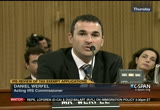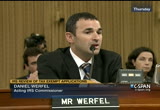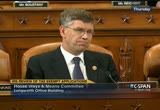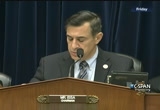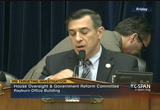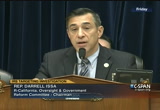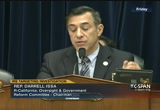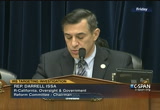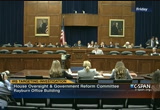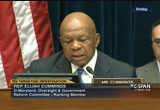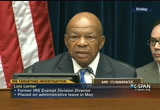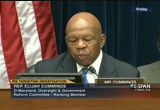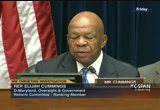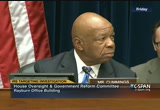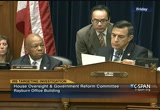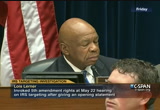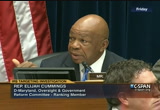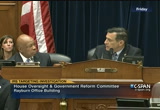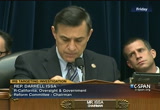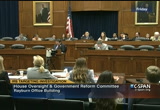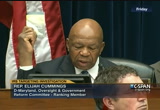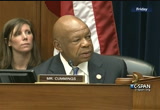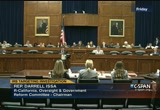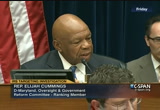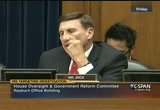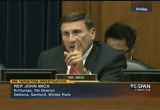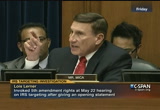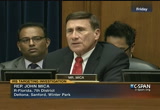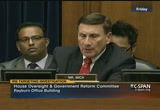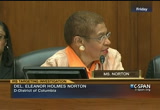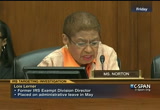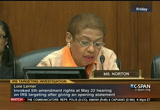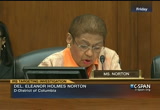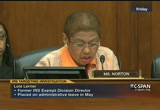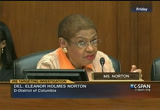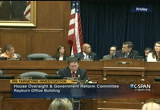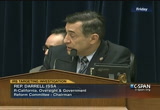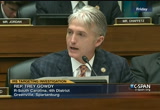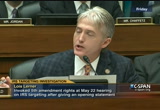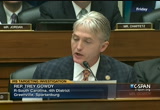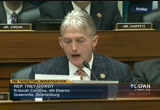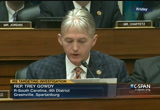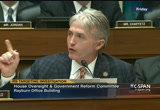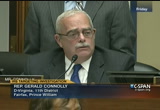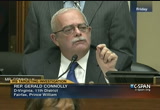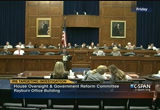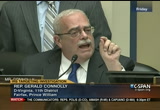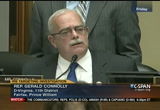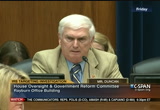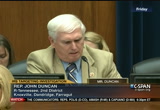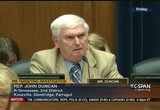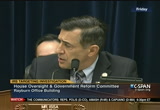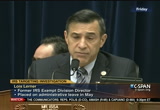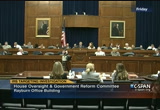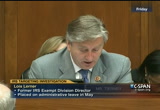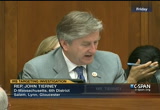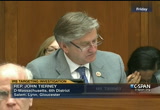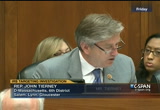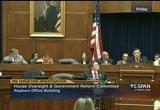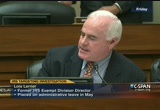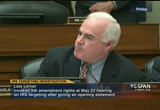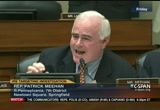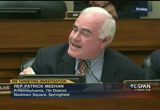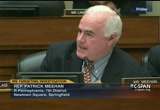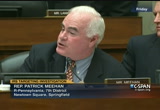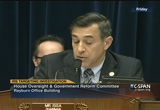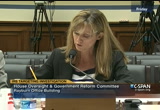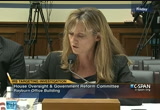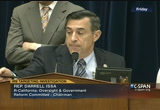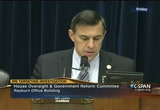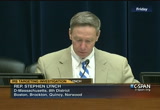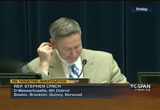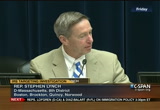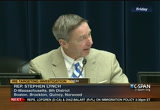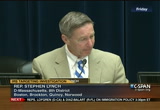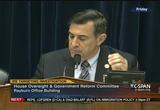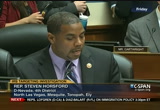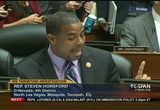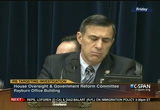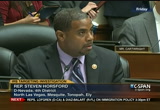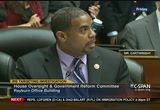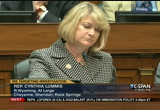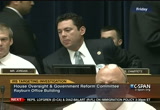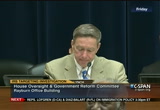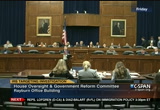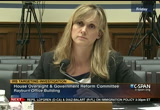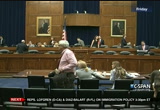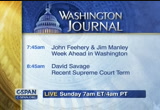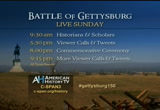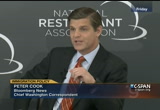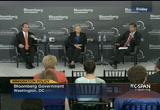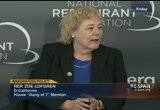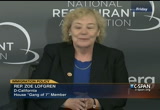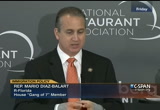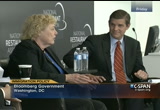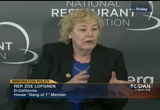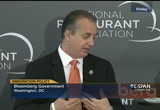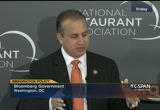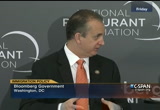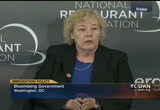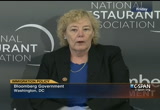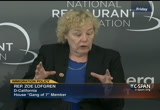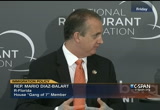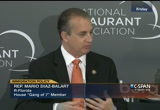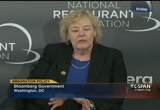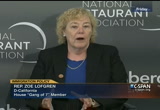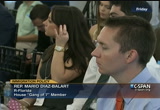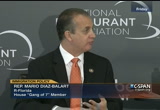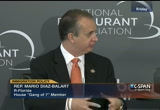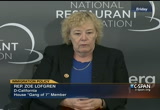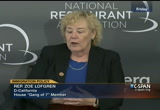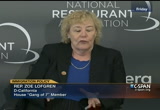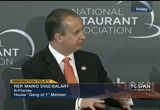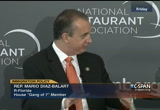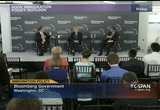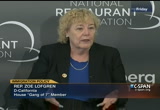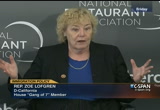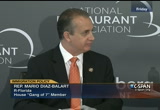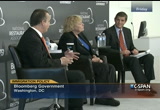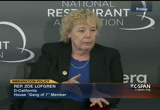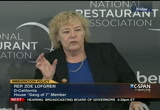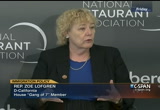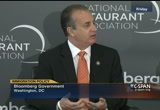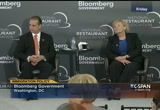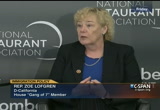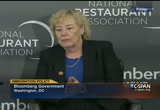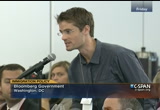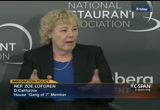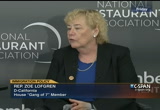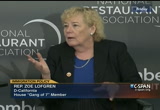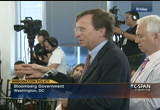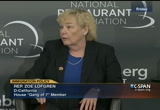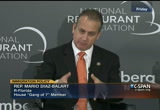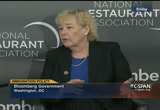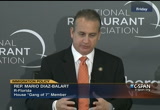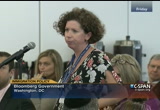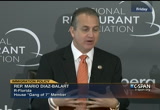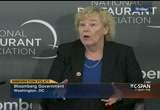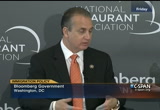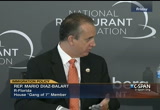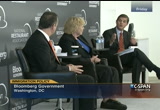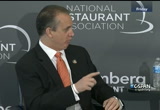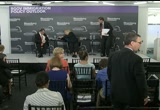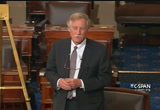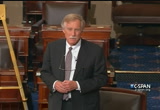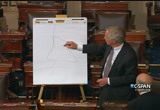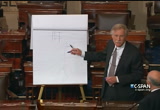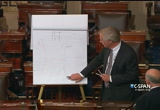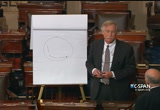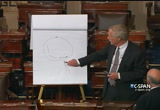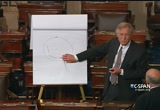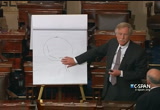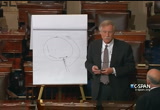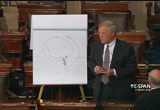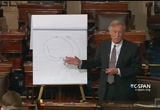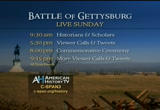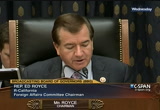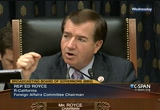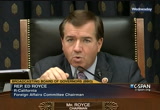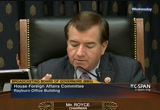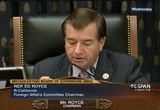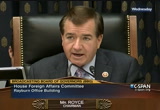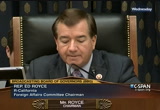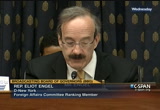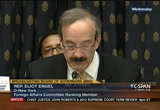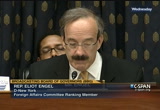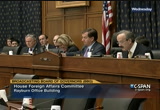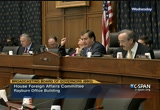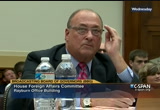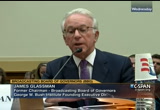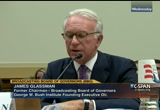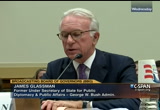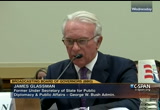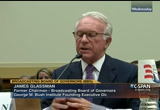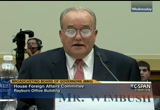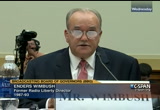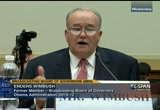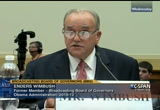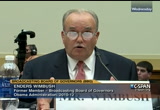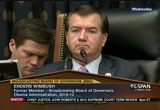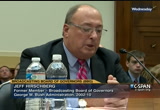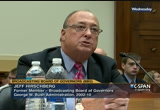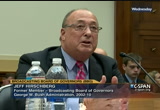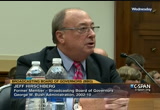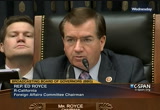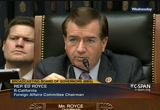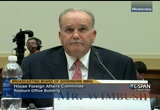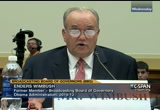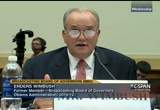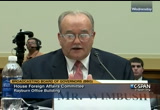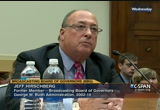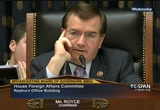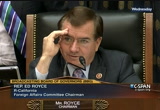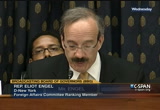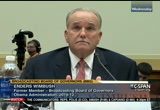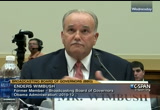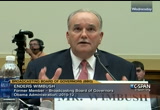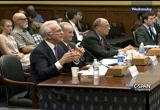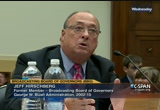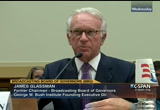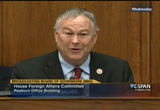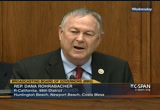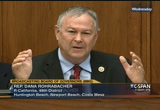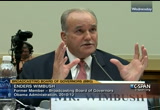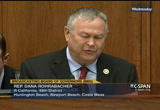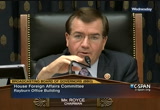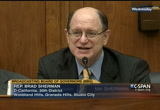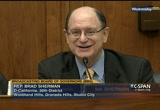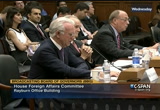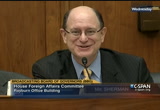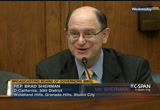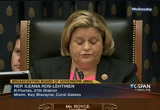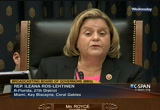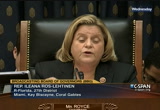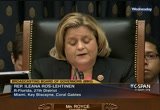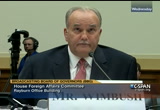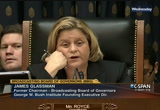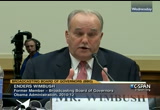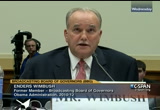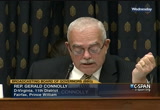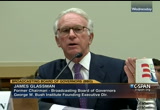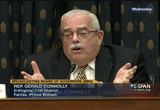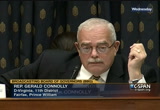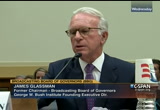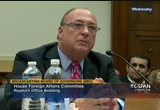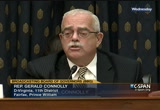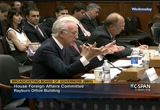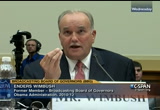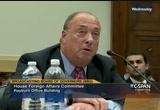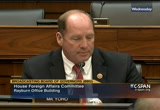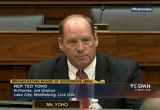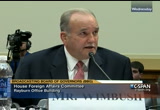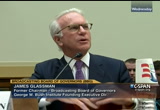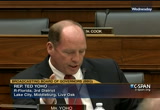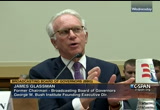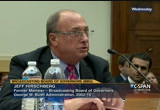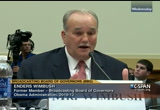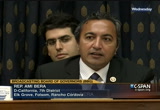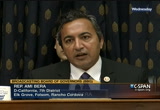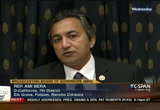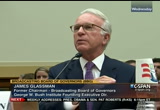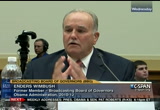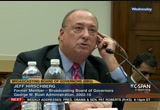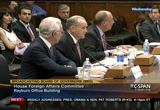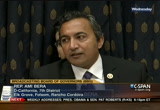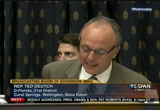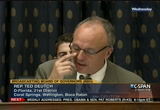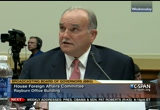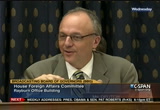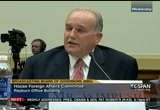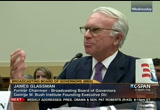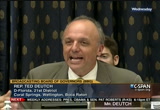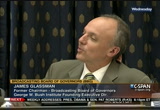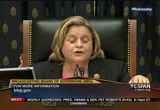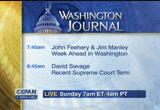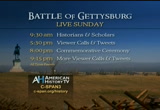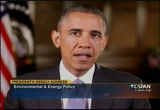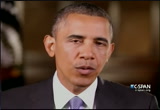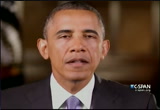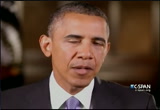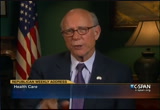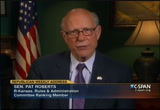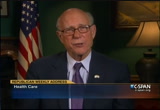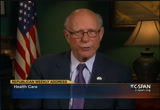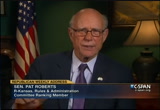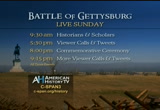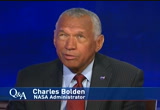tv Washington This Week CSPAN June 29, 2013 2:00pm-6:31pm EDT
2:00 pm
the irs would be interested in having the feedback in exploring those questions with the committee and figuring out the best way to get answers. our goal with this report was to present several things. first, to recognize for the failures up our front, to recognize we made fundamental mistakes. there are more questions to be asked about how those mistakes occurred. we recognize the mistakes exist. we want to show the american people we recognize them and putting together and actively implementing corrective actions to move forward. fromought in experts public-sector management to help lead the irs going forward on these new activities. some of the activities involve reviewing our current operations, to ask the questions you are answering. >> there are several employees
2:01 pm
who do you have described how you have to go through appropriate procedures. are you seeking the removal of individuals? does congress need to have legislative changes that would allow you to hold these employees accountable so we can make sure trust is restored? >> answer briefly. >> i will answer in two ways. with respect to a specifically, i can inform you of our actions. i have to do it in a non-public setting to protect employees' rights. there are due process procedures in place for federal employees with respect to how they are disciplined or how a potential removals are handled. i will not comment on whether they are good or bad. i am saying i am following the rule of law and moving as aggressively as we can. >> on friday, the house oversight committee passed a resolution that irs official lois lerner waved her fifth amendment right to remain
2:02 pm
silent in the hearing on targeting conservative groups. she was in charge of the tax- exempt organizations office and is now on administrative leave. this is about one hour and 20 minutes. >> the committee will come to order. the committee meets today to consider a resolution to determine whether lois lerner waived her fifth amendment privilege against self- incrimination when she made a voluntary opening statement during the committee's hearing that began on may 22, 2013.
2:03 pm
the clerk will designate the resolution. >> the resolution on the committee on oversight and government reform. >> without objection, the resolution will be considered as read and open for a minute at anyourth amendment point. the text has been distributed. i now recognize myself for an opening statement. we are here today to resolve something the united states has. did lois lerner waived her fifth amendment privilege against self-incrimination during the committee hearing that began may 22, 2013? during the hearing that began on may 22, more than five weeks ago, i tried to be exceedingly cautious. i did not make a quick or uninformed decision on the waiver. because the decision is one that does not often get made,
2:04 pm
and it is extremely important both to the discovery of its duties, and quite candidly, toward the real question of whether or not people would come and give one side of a story and not allow themselves be cross examined. as chairman, it is my obligation to be fair and impartial and to lead this committee not on one side or the other, but to the greatest extent possible to make my decisions in concert with the parliamentarian, with house counsel, and consistent with what we would want to have if and when the gavel moves to the other side of the aisle. my job as chairman is to bring the question to a vote so the committee could make a determination. as most know, when the
2:05 pm
congressman made his assertion during the hearing, i could have ruled just that, that she had waived. i felt it inappropriate to do it, recessed the committee hearing, and informed ms. lerner that she was subject to recall after a decision was made. gotten consulted and advice with house console. their determination is impartial. they have delivered to us both their opinion and the case law. having now considered the facts and arguments, i believe lois lerner waived her fifth amendment privileges. she did so when she chose to make a voluntary opening statement. ms. lerner's opening statement referenced the treasury ig
2:06 pm
report and the department of justice investigation. the assertion she previously theprovided -- sorry, and assertions that she previously provided false information to the committee. she made four specific denials appeared those denials are at the core of the committee investigation in this matter. she stated that she had not done anything wrong, not broken any laws, not violated any irs rules or regulations, and not provided false information to this or any other congressional committee regarding areas about which committee members would have liked to ask her questions. indeed, committee members are still interested in hearing from her, her statement covers almost the entire range of questions we wanted to ask when the hearing began on may 22.
2:07 pm
today marks the 37th day since ms. lerner appeared. since that time, i have considered the matter deliberately. i have received letters from lerner's lawyers that presented her arguments clearly and completely. her letter will now be entered into the record without objection, so ordered. we considered and sought appropriate counsel to reach our decision. counsel had her attorney's letters and made their determination and recommendation. and now it is time to put it to a vote. with that, i recognize the ranking member for his opening statement. >> thank you very much, mr. chairman. to date, this investigation has been characterized by a series of unsubstantiated accusations by members of congress with no
2:08 pm
evidence to support their claims. thetoday's preceding is latest unfortunate example. i often say that i would like our committee to operate more like a courtroom by gathering evidence in a responsible and impartial way. before drawing conclusions or making judgments. if this were a courtroom, the first question to ms. lerner would have been -- how do you plead? ms. lerner would have been able to state her innocence, and she never would have been forced to take the stand, swear an oath, or publicly assert her fifth amendment right. in this case, ms. lerner's attorney wrote to inform the committee before the hearing that his client would exercise her fifth amendment right. unlike in a courtroom, the
2:09 pm
chairman issued a subpoena forcing her to appear. made her stand and swear an oath, and challenge her fifth amendment assertion by posing questions to her anyway. so now the chairman wants the committee to conclude as a legal matter that ms. lerner waived her right because she made a statement professing her innocence. if this happened in a courtroom, the judge would likely hold a hearing on this question before making a ruling. counsel would prepare written legal briefs. the judge will hear oral arguments from all parties before making a determination. not happening here. the chairman is going about this in reverse.
2:10 pm
he is asking the committee to vote on the resolution first without taking basic common sense measures to help committee , republicans and democrats, make reasoned and informed decisions. let's look at the evidence before the committee. the first exhibit is a letter from her legal counsel. 2013, clearly 20, in 13 invoking his fifth amendment rights. asked to be entered into the record. >> without objection. >> exhibit d is a statement from daniel richmond who served as the chief appellate attorney in the united states attorney's office in new york stating, as a matter of law, she did not waive her privilege and would not be found to have done so by
2:11 pm
a competent at a record. this letter be entered in the record. exhibit c is a statement from the attorney who served as house counsel until 1983 stating i do not believe her brief introductory profession of innocence in which she offered no testimony or evidence constitutes a waiver of her fifth amendment rights. i asked that the document be entered into the record. >> without objection. d is a statement from a law professor that served as the chief appellate attorney in the united states attorney's office for the southern district of new york state in as a matter of law, she did not waive her privileged and would not be found to have done so by competent federal court.
2:12 pm
document behat entered into the record. >> all inclusions on your list will be included. >> exhibit e is a letter requesting an additional here he was with experts so members can consider this in a responsible way. i ask that document be in the record and i understand it will be. with all this information, what is on the other side? >> that chairman has a memorandum that he has declined to let other committee members say. his position is only he and i can review the memo. the memo is not in the record before us. in my letter on wednesday -- >> would the gentleman please yield before us. the instruction was that it cannot be released publicly since house counsel represents us. havere certainly free to each individual member as long as they are bound by the same
2:13 pm
understanding. our counsel is subject to attorney-client privileged, and you received separate advice from house counsel. that is a decision you make relative to the normal rules. >> i reclaim my time. i try to pay deference to the chairman on two staff memos. this is a memo dated june 26, 2013, 8:07 p.m. i am reading it and will take such time as is necessary. i asked you not distribute it widely, like to all members.
2:14 pm
the fact is next it says it is reasonably foreseen that a wide distribution could lead to public disclosure. the staff member that gave you this gave you this without a prohibition on any one of your members reading it. the concept would be that --bers could predict, could the members could read it, could seek independent counsel, every member on both sides and go to house counsel and seek an independent decision on their art. -- own. we simply were recognized and we did not public disclosure. as you and i would not want published his closure of any attorney representing us. >> are you saying, because i have not divulged one syllable of this to my members. that is in accordance with what i thought you were saying.
2:15 pm
you are saying my members can have -- >> your members can seek counsel directly and your members can read it, and suzanne is well aware of that. we are -- you and i may be rusty, but we have both have good counsel. the fact is every single member of the house can seek house counsel, and you did seek and received separate note from house counsel. this only implies not to lead to public disclosure. >> i want to make sure that -- i want it distributed now to our members, since i made a mistake. i was under the impression you were saying that my members could not see it, seeing what they are going to be relied on from counsel. i asked that it be distributed to our members now. and it not be disclosed to the public. >> i would caution members if they want to see any further, they can, but this is attorney- client from which, this is your
2:16 pm
attorneys of house counsel, but their citings are available to any member. >> i am trying to stay within the bounds that i thought were set. if members want to ask, once they read it, is that out of bounds? you follow what i am saying? in other words, my members are now going to be reading what you depended upon to hold this hearing. >> this is a markup. the resolution is available for amendment. it is distributed. ms. norton has a stripping amendment. the fact is we have had 37 days, plenty of debate. we have soft counsel. -- we have sought counsel.
2:17 pm
i have chosen a resolution even though i had the right to rule, even if i did not have counsel. this resolution is effectively a ruling of the chair that ms. lois lerner waived in her activity, and we are voting on the ruling of the chair. it is available format amendment. i caution never to use their did i caution members they are free to use their five minutes. i will not limit debate. this is a markup. it is like any other markup, and i have chosen to do that so my ruling would be published and open to a vote rather than simply the procedural tapering -- tabling of the chair that otherwise would happen. >> i am almost finished, thank you. on wednesday i asked every member be even the opportunity to hear directly from house counsel and pose any questions
2:18 pm
they have about the legal standards and historical precedents. the chairman declined to honor my request. here's what may happen if we continue down this path. the republicans could adopt a resolution on a partisan vote. the chairman could force ms. lerner to return and director to answer questions. heard attorney will disagree with the legal basis for the resolution, and ms. lerner will continue to assert the fifth. after which the chairman could schedule a vote to hold her in content and send the entire matter to a court. after that happens, the record before the court will be the record we established today. the committee has held no hearings on this issue. no committee has taken testimony from any legal experts. the chairman never responded to legal counsel. the chairman never responded to her counsel. chairman declined my request for a meeting to allow members to hear directly from counsel. the chairman chose not to allow
2:19 pm
all committee members to review the opinion, and that has just been changed. thank you. the committee adopted no report or other analysis of the applicable legal provisions in the historical precedents. let me close by making clear that i want to hear ms. lerner's testimony. very,k her testimony is very important. i agree she has information that is relevant to the committees investigation. for example, i want to ask why did she not inform congress in 2012 of the improper practices she discovered in 2011. but we must respect the constitutional rights of every witness who comes before this committee, and whatever your interpretation of the law is in this instance, we should all agree that this is not a responsible record to put forward because it undermines the credibility of this committee and the legitimacy of the resolution itself.
2:20 pm
thequest stands, i asked committee first take the preliminary commonsense step of holding a hearing to listen to legal experts former party members to vote. otherwise as a member of the congress who is sworn to uphold the constitution, i cannot in good conscience support this resolution, and with that i yield act. a no, i will not hold hearing. no, i do not agree with your position that you were denied any access to counsel. opinion that was shared with you out of courtesy was an opinion we sought among which means we gave you more than would ordinarily happen. >> when you say we, i want to make sure i understand what you are saying. >> the house counsel information that was shared with you, we requested and we shared what we got back with you. >> who is we? >> the majority.
2:21 pm
the fact is you can seek counsel, every member can seek counsel. having said that, i find it odd that you would decide that we need to make a record before the court. if this were going to a federal judge, the judge would only consider ms. lerner's actual activity and would be making a decision de nova. having said that, i cannot nor would any chairman of either party hold hearings every time there is misbehavior, improper conduct of a witness. you can understand the committee cannot be turned into everyone coming and doing that. to lerner was here pursuant a deposition, a subpoena, and was represented by counsel. >> mr. chairman, one moment.
2:22 pm
mr. chairman, i am not trying to make this more difficult than it should be. it is just that i think when we are dealing with -- i'm very sensitive to this constitution, because i would not be here if it was not for it. we are dealing with people's rights, i think we need to make sure that at least -- the only thing i was asking and i know you have denied it, and that is all well and good, the only thing i was asking is we make sure that the members when they vote, they have access to the legal assessments of these arguments. there are clearly two sides. the chairman is the chairman, and so i yield back. >> i thank the gentleman. i will hold the record opene until the end of the day.
2:23 pm
does any member wish to speak of the bill? the gentleman from florida. >> again, from the perspective of being here, a senior member of the panel, i have never seen an instance in which a witness would thwart our responsibility in such an offensive manner. i am saddened that the ranking member would not work with us on moving forward. areays some things that correct. he said some things that are dramatically wrong. or so of all, if you hold up the constitution, just open it up, it has three distinct branches of government -- a legislative branch, and executive branch, and a judicial branch.
2:24 pm
rights are contained at the end in the bill of rights, and we want to comply with those. thisn fact, the right of committee and the congress to conduct its business as set forth by the constitution is being -- is attempted to be thwarted by a government employee. our job -- we were sent here to review the conduct that is clear. our responsibility is very important to conduct oversight and investigations. we are the chief panel in the house of representatives. lois lerner is a federal employee who failed to appear at our request. under the rules of the house and this committee, she was issued a subpoena. she appeared. she was given the opportunity to exert her fifth amendment.
2:25 pm
she in fact waived that right by giving her testimony and her position, thumbing her nose at this rightful committee under constitution and our legislative authority. lois lerner is in fact a poster child for thumbing her nose at congress. haveelling you, i absolutely had it with what we have seen, the power of this new at stake. estate. it not in the constitution that there is a fourth branch that can tell us to go to hell. we have a responsibility to investigate what was going on. she has been given her rights. what the ranking member said is correct. we will follow the process. the decision is this committee today, to act on the resolution, and in fact this individual has thwarted the
2:26 pm
responsibility of this committee to investigate for her to testify. she will be given the opportunity when she comes back to take the fifth, but in fact we are voting today on the fact that she waved it. that is a committee decision. we have a right to make that. we should back our chairman for the precedents for the future, and it is important that it should be set. this may not always be a republican majority. today is a showdown in who is in control of the government and whether we honor the constitution. the rules of this committee and our responsibility as members of congress center on behalf of people out there this morning, got up in the middle of the night, work and at hey there taxes and expect us to sit oversee what the bureaucrats are doing. in fact, when you have the
2:27 pm
financial arm, the irs, of the united states spinning out of control, as we have seen in this instance, with a bureaucrat thumbing her nose at somethings, there's dramatically wrong. i urge the adoption of this resolution. she will have her say. to will have her right exercise her fifth amendment right, and the ranking member is correct. she may be held in contempt in the future. again, this is in fact a -- andn today between an emerging bureaucracy that has spawned out of control. if you do not see it, you are in trouble.
2:28 pm
i yield back. >> thank you. or what purpose does the lady request recognition? >> i have an amendment in the nature of the substitute. >> the amendment in the nature of the substitute to the resolution of the committee on oversight and government reform, all offered by ms. norton. >> the memo is considered read. >> thank you. this committee is fond of citing the constitution. i offer this resolution in order to allow us to show we mean it. i agree with the chairman that a hearing here would be unusual, when there is reported this conduct. -- when there is reported misconduct. we do not have a hearing on it every time someone objects. it is also clear that this is a novel issue and a close question, and all one has to do is to look at the authorities and see how they line up on both sides of when a witness waives her constitutional rights. toh sides are anxious question lois lerner, because
2:29 pm
she may be the witness in the only position to get to the root of where the origin of the controversy involving the irs was. the justice department has itself opened an investigation. ms. lerner took the fifth amendment and issued a short statement proclaiming her innocence. i have looked at the authorities. the reason i offer this amendment in the nature of a substitute is that although i have spent most of my professional life, when i was not a public official, either as a practicing lawyer or a
2:30 pm
professor of law, i have no immediate opinion pro or con and still do not. mynly have a few minutes on own to scant the authorities. i decided to write this last night only upon learning that there would be a vote on this matter. i would have to vote that an american citizen had waived a constitutional right. that is a very heavy burden. i learned that there had been correspondence from the ranking member, that there had been an expert opinion from house counsel. that counsel was regarded as an attorney-client matter, was not
2:31 pm
available to us. i learned further of course that is lerner's counsel had written to the committee to offer his authorities to my that she did not wait for constitutional rights. waive her rights. clearly, wherever you come down on this issue, there are decidedly different precedents on when an american citizen waves her constitutional rights, including her fifth amendment rights. i do not see any basis for the committee to conclude that the question of waiver is clear and settled on the information before us now. my resolution might well yield no different results from what the chairman seeks through his
2:32 pm
resolution. but it calls for a hearing, but at the very least, would educate members sufficiently to make them feel comfortable in actually voting that an american citizen had waived a precious constitutional right. becometh amendment has perhaps the most unpopular amendment of all the amendments in the bill of rights, but it was one of the favorites of the framers. no court would strictly construe a waiver of any constitutional right without more information than we have before us now. we are not a court. but i had taught the committee took seriously, even revered the constitution. the fifth amendment has a long and storied history in this
2:33 pm
congress. much of it among the most discredited in the history of this body. the point of calling lois lerner was to discover what no other witness can tell us. it is still our -- >> will the gentlelady please wrap up. >> it s still our purpose, i would hope that we could find a way to get to the real point of hearing from her, perhaps by offering her immunity through some kind of negotiations with her counsel. that is what we all want. voting to waive her constitutional right is a last resort. i do not believe we are at that point yet.
2:34 pm
we may get to that point. >> will the gentlelady yield. i will not be supporting your amendment, but i wanted to make clear, trying to get her testimony, offering immunity, all of that by definition comes after the assertion during the earlier hearing that she had waived. as i said earlier, we are dealing with a motion that originated that she had waived, a decision that i reserved for 37 days-- >> are you saying since she waived, we do not need to discuss whether perhaps she would testify if given immunity? >> the decision to whether she waived and the decision of whether they would proffer and all those decisions, quite frankly are not going to happen until after we conclude her testimony, which she began, continued, and then stopped
2:35 pm
earlier. she is still a witness pending from a recessed hearing, and that is what we are doing today, repairing to go forward with the hearing. >> have you considered offering her immunity so we may discover the evidence received from her? >> i apologies, but there are some things that cannot be said in an open hearing. >> but to waive her constitutional rights? we are supposed to vote on that. that is very serious. >> we were all here, or eligible to be here. we have noticed this markup pursuant to the rules. the gentlelady had 37 days in which to seek counsel's. >> 37 days you noticed this hearing/ >> as to the question of a statement made -- >> when did you notice this
2:36 pm
hearing, mr. chairman? >>the gentlelady's time is expired. i will now recognize the gentleman from south carolina. >> the prospect of having another hearing seems to resistible accept that that would not disclose one single solitary relevant fact. all facts necessary are already in the record. ms. lerner is not coming back, and i do not need law professors to home for a second hearing and reading the case law. there were not be one additional fact, uncovered at a second hearing. what facts do we have at our disposal? i have identified nine separate specific assertions made by lois lerner on may 22, and i was after she asserted her right against privilege. nine separate assertions, including i have done nothing
2:37 pm
wrong. i have broken no laws. i have provided no false information to congress. i had violated no irs rules. i've violated no irs relations. -- regulations. and then she authenticated a document. all of this after she info to -- her right to remain silent, nine separate factual assertions in the authenticating of a document after, with advice to counsel, with the advice of counsel sitting right behind her. she testified to nine separate assertions, and then authenticated a document. mr. chairman, the case law to me is clear. that is not the way the fifth amendment works. you do not get to tell your side of the story and then avoid the very process that we have in this system for eliciting the truth, which is cross examination. why do we have a confrontation clause?
2:38 pm
to my colleagues on the other side? the cross examination is the best tactic for eliciting the truth. they witness has to sit on stand, and they have to weigh in balance, what are the benefits of saying nothing, which is my right, or what are the benefits of getting my side of the story out? that is what you have to balance, saying nothing versus telling her side of the story. --her chairman, there's no mr. chairman, there is no contemplation in the constitution that you tell your side of the story and you are never cross examined. the supreme court agrees with. mr. chairman, these are two quotes -- a witness may not testify and then vote against self-incrimination when questioned about details. in brown versus united states, a witness waives the privilege by voluntary giving testimony.
2:39 pm
a denial of activities that might provide a basis for prosecution constitutes a waiver of that privilege. she has a right to remain silent. she could have said nothing. youad a witness this week -- we had a witness this week who did that. we had a witness who said nothing. she did not. she made nine separate factual assertions. and then she authenticated a document. if that is not waiver, if that is not express waiver, then clearly it is implied waiver, and if not implied waiver, what is? if getting your side of it, nine separate facts, and, mr. chairman, i have to add this. factualom certain assertions, this witness volunteered -- and this is important -- she testified that
2:40 pm
she has done "nothing wrong." i know my friends on the other side of the aisle will conclude that is a broad statement. it is tantamount to --it is a double negative. what she is really saying is i have done everything right. to say i have done nothing wrong is to really say i have done everything right. so, mr. chairman, what possibly could be a broader assertion of fact than to say i have done everything right? i want to say this in conclusion, because my time is almost up. i have had private conversations with colleagues on side, other than to say that i have benefited from their counsel.
2:41 pm
there are some very good attorneys on the other side of the aisle as there are on this side. the way i view this is this is congress asserting its constitutional obligation to provide oversight. yes, she has a constitutional right to remain silent, and she could have invoked it, but she did not. and we have a constitutional obligation to provide oversight. so we could have another hearing. there is not going to be one more fact that is part of this record, not one. we will bring a law professor to say she waived, you will bring one to say that she did not, and we will be right where we are today. all the facts that we are going to have our here right now. nine separate factual assertions. if that is invoking your right to remain silent, then there is no such thing as waiver, no such thing. >> the gentleman yields back. for what purpose does the gentleman rise? >> i wish to speak to the
2:42 pm
resolution. with the gentleman be speaking to the amendment or the resolution? >> the gentleman is recognized to speak to the amendment in the nature of a substitute offered by the gentlelady from the district of columbia in regular order. >> could i ask that my time has been restored? >> no, he took it. >> thank you. i wish to support the amendment offered by the gentlelady from the district because i think actually there are more facts to be heard and there are other points of view to be heard. what we are about today is not to prosecute lois lerner, ably though our colleague from south carolina seems to be doing. theeems to ensure constitutional rights of a citizen.
2:43 pm
mr mica referred to her as a bureaucrat thumbing her nose at congress, and that is what this is about. that is not what this is about. this is first and foremost it was lerner, a citizen, invoking one of the most sacred privileges and tried in the bill of rights, her fifth amendment right to protect herself. the record will show which he was summoned she resisted him and she invoked her fifth amendment right. she came here under subpoena, a partisan issued subpoena, not supported by our side. against her will. and she made a statement and then refuse to answer any questions, and was dismissed by the chairman come up properly so. mr. gowdy would have you believe the fact that she made any statement constitutes a waiver of her constitutional
2:44 pm
right, not just self- incriminating. i beg to differ. a slot is very clear, that the -- case law is very clear that the fact that she made a statement does not somehow constitute a waiver. there's a famous case during a different era, united states vs. hogue in which mr. hogue made a statement. i am not so engaged. i have never engaged in espionage. i will not so engage in the future. i am not a spy or saboteurs. and then invoke the fifth amendment. the court found that did not constitute a waiver, just like this case, lois. courtr case, the supreme was crystal clear that it is a very high standard you have to meet before you can determine that someone in fact has waived their fifth amendment. i think the record is quite clear ms. lois intended from
2:45 pm
the beginning to invoke her fifth amendment and protect herself as an american citizen as she is entitled to do. we would like to hear her testimony. i would, too. if we do this today, every american citizen is at risk who is ever summoned before this committee, and it could be construed, as though i am sure that is not the intent, that by insisting she appear under subpoena and having her at the witness table, one observer --ld claim she could claim a it constituted entrapment. i'm sure not that is what our intent was, but i would put out that the d.c. bar ethics code says when someone has invoked the fifth amendment, it is wrong to haul them before a committee, and the word they use is, if the only purpose to be served by doing that is to pillory them, that is the verb,
2:46 pm
which invokes images of different eras in american history that the fifth amendment was designed to prevent from recurring. like the salem witch trials. where people were pilloried and worse. i believe that if we pass this resolution, we are trampling on the rights of an american citizen him and that trumps everything. that trumps the need for her testimony to my that trumps her status as a federal employee, that trumps her status as an official at the irs. if we are not about protecting the rights of american citizens, what are we about as members of congress? i urge colleages to put aside politics here. i urge my colleagues to go carefully about what we are about to do. you may make a small political
2:47 pm
gain by passing this resolution, with long-term costs, and you will erode the confidence in the people in what we are about, and there is an institutional commitment all of us need to be concerned about. and i plead with my colleagues to think carefully, why not take some time and have a hearing so we can air this out? i yield back. >> i recognize the gentleman from tennessee. >> i rise to speak in opposition to the amendment in the nature of a substitute. >> the gentleman is recognized. >> i thank the actions of the chairman in bringing up this resolution, which are entirely appropriate, and i understand they are bringing done under the advice of house counsel and i wish to second their marks by my colleague mr. gowdy. i spent many years as a law
2:48 pm
year and a judge coming to congress and spent the last7 1/2 years trying felony criminal cases. every case i have read about the fifth amendment would not allowed and in fact as a lawyer i never would have advised a client that they could give a statement under oath and then plead the fifth. as a judge, i would never allow a defendant in my court to testify and make a statement and emphatically declare their innocence and then plead the fifth at that point. that would make a mockery out of the fifth amendment. and i think it is accurate to say the record will show that i was a judge who leaned very much in favor of defendants. i was never a prosecutor, and i
2:49 pm
did everything possible as a judge to bend over backwards to make sure that all defendants appearing in my court got every right that they were entitled to. but lois lerner came in here and on nine separate occasions declared her innocence or strongly asserted that she had done nothing wrong, repeatedly. toannot allow witnesses testify under oath and then plead the fifth to keep from being questioned or cross- examine. it is not fair, it is not consistent with the history of our country and judicial history. the key here is that committee is operating under rules different from other committees. the other committees in congress do not swear witnesses and place them under oath before they testify.
2:50 pm
lois lerner came here under oath and he essentially told her side of the case and then pled fifth, denying them i self, mr. gowdy, and other members any opportunity to question her or cross-examine her. so i rise in opposition or speak in opposition to the amendment in the nature of a substitute, and i believe the actions of the chairman in bringing forth this underlying resolution are entirely appropriate and consistent with all the legal precedents and history in this country. thank you very much. >> i thank the gentleman. i take a short moment to respond to my friend from virginia, who spoke so eloquently about the sanctity of the fifth amendment. i think it is important that somebody be represented by counsel, and ms. lerner was. --is more important through
2:51 pm
to realize that most important that she made voluntary decisions, not just a decision to make an opening statement that made claims and assertions on point, but then to answer additional questions after she invoked her fifth-amendment privilege to answer additional questions. i am not an attorney, even though i serve on judiciary and have this obligation here today. that is why we sought counsel and took the time. it is the result of recognizing there is both a legal precedent for this, and many people here have not taken the time for it over the last 37 days, but the important thing is the respect for the constitution is also respect for the fact that if somebody comes and gives testimony, they become subject to cross-examination. and the decision here today is to my did she have testimony,
2:52 pm
and did she choose to take offense,, and is she subject to -- did she give testimony and then choose to take the fifth? -- it is she to subject to that cross- examination? i know everybody here in this room, if accused of a crime or even just being sued a month they would want a right to cross-examination. we the people would like to cross--examine her. i thank the gentleman for yielding back. >> the gentleman is recognized. >> i think this is an incredibly serious question put to this committee. all of us want to hear what she has to say and what information she may bring. we want to do our job and get
2:53 pm
on with the investigation that underlies this. where hopefully just as concerned about aching sure -- we are hopefully just as concerned about making sure of this committee upholds the constitution, particularly, the fifth amendment rights on any citizen matter what we think of the citizen's earlier activities or statements. i am concerned that this proceeding, she was subpoenaed her attorney made it clear that she was going to plead the fifth, and yet he continued to force her to come in before the committee. as mr. connolly said, what for? to pillory her? in the judicial process, and i think mr. connolly made it clear, that is not the usual way to proceed. in this bar it would be considered a questionable practice to put somebody in that kind of an untenable situation. i'm concerned from the outside
2:54 pm
of what that was about, about spectacle or about trying to move this matter forward on that. i am also concerned that we are dealing with an issue of law here. you're asking this group of non-lawyers to make a decision based on a consultative legal question, and it is not as cut as dried as some wish it were. we have had some days where we relight the chairman was going to move in this direction to seek out some advice and we got advice on both sides. some experts, on either side of the issue, and it deserves a full exposition here as the amendment would do of having experts come in and breathe us -- brief us and testify as to what underlies their opinions. the formal counsel stated that that introduction to the committee was a profession of her innocence, offered prior to the commencement of questioning.
2:55 pm
tocontained no fax relating representations to the subject matter and denied wrongdoing. he would not recommend that she be brought in for contempt or found that she had waived her rights. another expert from columbia makes it clear his opinion that her willingness and response to the requests that she authenticate her prior statements deprive her to the fifth amendment privilege, which did not happen. her willingness to authenticate them to admit the prior statements are made without concessions of veracity is not testimony of substance to the prior state and straight he gave -- to prior statements and he gave a siding for that. there's conflicting information on that. although the chairman indicates members were allowed to see his requests for house counsel opinion, i am looking at the e-
2:56 pm
mail that went back-and-forth that says i says i would also ask that you not distribute it widely, " like to all of your members." yourestion is, which of members here, would you like not to see this, would you like not to be fully briefed before they made this decision? which members have different status than members on your side, whom you were willing to share this in advance? that is entirely unreasonable and unfair and should not happen, and i find that his offenses to people who might be included in that category. we have not had ample time that an exposition of facts. we have been deprived. how is mr. cummings likely to determine -- >> would the gentleman yield? >> in a second. i want to make this point as
2:57 pm
clearly as i can. i am reading. the ramifications are bad for the house. i would ask that you not distribute it widely like to all of your members. i would yield only of the gentleman wants tell us which one of all these members in the majority would not want to see the report? >> the chairman yields? >> for that purpose. >> the gentleman should not have to answer that question. >> i am sorry that you are offended -- sharing of an opinion. >> if you are not going to answer, i claim my time-- >> this was an opinion given to the majority on my request. this was the chairman's request. >> it was an opinion to the members of the house -- >> no, that was not correct. >> who did you not want to see that report? >> the gentleman's time is expired. >> legitimate excuses -- the gentleman's excuses have waned, too. quickly now go to the gentleman
2:58 pm
from pennsylvania. >> losing the focus of our purpose. i have great regard for the gentlelady from washington who has looked from the perspective of both sides of the equation. we are doing a great deal of talk about the characterization of lois lerner and the idea that somehow we are here attempting to embarrass the witness. i go back to the point, we are not here with regard to lois lerner. we are here because there are american citizens who were affected by the agency that she oversaw who used her authority in the irs to what we believe to be an impressive fashion oppressive fas hion against what could be their
2:59 pm
constitutional rights, and, potentially, any criminal fashion. and so, what we really have, we are engaged in a civil proceeding. and to the extent to which lois lerner has rights that she can invoke using her fifth amendment, they were to any ultimate question that she may be accountable to any criminal for, not here. what she says here may be relevant, and there's plenty of history with regard to that issue. but let's go to the facts of what happened here. we are here on a civil proceeding, and we do have a responsibility, and oversight responsibility, to address that which we just articulated, it is the responsibility to assure that the rights of citizens have not been oppressed by the irs. any lerner does not have right to refuse to answer questions before this committee unless they would in fact incriminate her. she may in fact -even-and it is not uncommon in the civil
3:00 pm
process of law, for a person to come in and be deposed and under normal course of questions go through, she has competent counsel, and there are questions that will be answered, and counsel will take a particular question and say that goes to the potential, that it might be a meaningful basis that it could incriminate her criminally, and there is a broad reading of that. i suspect that lois order comes back here, she will invoke the fifth amendment to quite a few. in fact, everything. the fact of the matters, we but what changed is with competent counsel sitting at that table some of the best attorneys available and lois learner is an attorney herself who practiced in the department of justice. so she comes here with a higher degree of awareness of what she was doing. she voluntarily changed the dynamic. when she chose to use this forum, a forum in which she was quite aware that there was going to be national forum for
3:01 pm
her to declare whatever it is that she wanted to do. and she used this occasion very specifically and the gentleman from south carolina went through and articulated very eloquently the number of ways in which she opened the door. i have in my hands here the letter from counsel. we knew what she was doing by invoking the fifth. all she had to do was sit there and say i invoke the fifth. end of case. we wouldn't be here today. but she is the one that put into this record the subject matter. she opened the door to the subject matter. she is the one that included the references to the ig report which talked about inappropriate activity on the part of the i.r.s. and talking about specifically potential political activity that was inappropriate. she is the one that brought the ig's report into this. she is the one who talked about
3:02 pm
the issues that were before her prior testimony before committees. and then made these statements. i did not break any laws. i did not violate any i.r.s. rules or regulations. i did not give any false testimony to this or any other congressional committee. with respect to all of the things that had just previously been identified. that is the subject matter in which she put it into play. that is a voluntary waiver. and in determination on her part with counsel sitting right behind her. we are here today because lois learner made a choice. she made a choice to use this forum for her purposes. and i ask this committee to remember why we were here. not for lois learner but to make sure that we stand up for the rights of those who have been oppressed by the i.r.s. i conclude my comments by saying lois learner is not surrendering any fifth
3:03 pm
amendment right because we can foresee what's going to happen down the line. to the extent that she will invoke fifth amendment privilege and we hold her in contempt it will go before ultimately a qualified court of law. and there it will be briefed and there they will have the best of attorneys if in fact it gets to that matter. and prior to that there may be a decision for other kinds of activities this committee would make that would make that issue not relevant. but as to today, as to this moment, lois learner opened the door and she can't have it both ways. and i believe at this point in time this is a simple resolution which is simply saying that we have the ability to ask her to come back to answer questions with regard to the issues that she opened the door to. and we may -- she may ultimately then invoke her fifth amendment and we will be back at a further proceeding. but this is not something that violates her rights. i urge my colleagues to support
3:04 pm
this resolution. >> the question is on agreeing to the amendment offered by the gentlelady from the district of columbia. all those in favor will signify by saying aye. all those opposed no. in the opinion of the chair the nos have it the nos have it. the amendment is not agreed to. >> mr. chairman. i ask to be recognized. for five minutes. >> i did not recognize the gentleman. >> i know. you talked right over me sir. >> are you requesting a roll call vote. >> no i'm asking for five minutes to speak. >> you'll have five minutes on the amendment. on the resolution. >> i am asking for a roll call vote. >> you're very welcomed. he clerk will call the roll.
3:07 pm
3:08 pm
>> pursuant to the previous announcement the committee will come to order. is there anyone here who wishes o speak on the resolution? i'll be patient. i'll recognize myself lest we lose the time. today we have had ample debate on the question of a straightforward resolution. did ms. lois learner on may 30, 2013, in all or part proceed
3:09 pm
after asserting her fifth amendment privilege? and if so did she waive. that will be the question to be decided in the vote that will come momentarily. it is my assertion that she did . having heard the debate i have not changed my position. and i will reserve pending. for what purpose does the gentleman from massachusetts seek recognition? >> well, mr. chairman, as you know -- >> would you like to move to strike the last word? >> i would. >> the gentleman is recognized for 5 minutes. >> i do want to note for the record that i originally requested time on the amendment. that time has been denied me. but -- notting i can do about that now. i do agree this is a serious question before the committee. we have balancing interests
3:10 pm
here. one is we certainly need to be able to call witnesses before this committee and expect the truth. i think that's at the very core of our ability to conduct meaningful oversight and reasonable oversight. is that certainly ecertainly, certainly this committee and the role that it plays. on the other hand, there is a in the tional right fifth amendment to have a itness avoid self-incrimination. and that's extremely important. i believe the gentleman from florida spoke earlier today. american ended that citizens might thumb their nose at the government. i think that's a constitutional
3:11 pm
right. and considering the fact that congress' favorable ratings are about 6% there's probably a lot of americans that would use a different finger with respect to congress today. >> is the gentleman referring to the upcoming parade? >> i'm not sure what you mean. reclaiming my time. in light of the scandals with nsa, i think a lot of americans seriously doubt the integrity of some of their governmental institutions including our own. but this hearing does not set the precedent that the gentleman from florida spoke of earlier. we have not had a hearing on this. we have not done the meaningful investigation that would explain to the court and look we assume that there will be a
3:12 pm
contempt citation issues by the congress. it will be appealed to the court. and at some point the court will look and they will say how did congress arrive, how did the committee first of all on government reform arrive at this decision that ms. learner was in contempt? and they will look at the underlying record. that's what they'll look at. what is the reasonableness and what is the thoroughness of congress' inquiry? i disagree with the gentleman's earlier statement, the chairman's statement that we have had a lot of public debate about this. we have not had debate in this committee over this. we have not had one word. we've had debate over this motion but we have not had witnesses, we have not had constitutional scholars come in and inform the decisions of the members. you have a lot of nonlawyers here. and i think they will find that our decision was based on
3:13 pm
political conversations and not on meaningful inquiry and thorough oversight. so i think what we are doing here today will doom our efforts to hold ms. lerner accountable because we haven't done the oversight, we haven't provided the underpinnings for our decision to be upheld at the court level. we're playing into their hands by not having the hearings. because i think we could -- look i think you've got some votes on this side if this was handled correctly that you would have people who justifiably agree with the way the at least inartful way that ms. lerner came forward and asserted her fifth amendment rights. but i think that's all being wiped out by a political process. this is supposed to be a legislative process, an investigative process and it has been none of that. we have not had the meaningful
3:14 pm
delibtive process that i think would give weight to our decision. that's a failing of this process today. this will not be press dential. it will -- we should have a decision that has precedent on how a witness must act before this committee. we're not going to get there from this process because there's been no underlying credibility lent to this process. this has been just a political process. and i regret that. so i will vote against this but not on the merits but because of the lack of process that we have had here and that we really haven't done an investigation on this issue. i yield back. >> thank you. i now move the committee on oversight and government reform approve the -- >> point of order. >> yes. >> you indicated earlier portion of this hearing that all members would have time. >> i never said all members. does the gentleman seek recognition?
3:15 pm
>> yes, i do. >> the gentleman is recognized for five minutes. >> mr. chairman, this back and forth political bickering is an embarrassment. the gentleman from florida many mica said earlier that this is a showdown. it's more like showing off. it's the same grand standing we have seen repeatedly in this committee. the chairman conths to focus this committee on devicive hearings and witch hunts rather than identifying solutions to make reforms to government programs and agencies. instead of bringing up a resolution to challenge a person's right to plead the fifth, why aren't we bringing forward a resolution to require the i.r.s. to bring their 501(c)(4) regulations primarily into compliance with federal law? which says exclusively, this is no longer just about lois lerner. there are clearly problems at the i.r.s..
3:16 pm
that much is clear. but instead of this resolution, why aren't we following up to the nine recommendations that the inspector general has already made to guarantee that the targeting that happened to both conrvative and liberal groups never happens again. these are the issues the american people want us to focus on not more partisan bickering and gridlook. until we focus on solutions, congress will continue to be held in the lowest of regards among the american people. and i for one don't want to be part of tearing this institution down but building it up. but the american people are rightfully upset with us. >> will the gentleman yield? >> no i will not. >> will the gentleman yield? >> no i will not. the american people are rightfully upset with us. and it's because of what we're doing here today. if this resolution were to
3:17 pm
pass, what type of precedent are we setting? who are we in this committee to take away anyone's constitutional rights? what happened to those who were targeted is wrong and this resolution does nothing to fix it. this process is completely improper and nothing more than an opportunity to grandstand so i will oppose the motion. already the gentleman yield? >> no i will not. >> i was just curious as to what targeting what is the witch hunt? >> i have not yielded mr. chairman. >> then we'll have regular order. it's the gentleman's time. >> the gentleman -- there are nine -- >> it's the gentleman's time. >> within the inspector general report that we have not taken any time to follow up on or implemented. we have heard from the new acting commissioner from the i.r.s. that their regulation is
3:18 pm
in fact out of compliance with federal law. we have taken no action to bring forward a resolution directing the i.r.s. to do its jobs to update that regulation so that it is in compliance with federal law. we have taken no action to reform the other aspects of the i.r.s. agency which there is agreement on both sides needs to be fixed. all i'm asking for is for us as the members of this body to do our job. i'm not a lawyer and i'm not here to decide whether or not this resolution taken away someone's constitutional right is proper. but what i am here is as a representative of my constituents. and they didn't send me here to take away the rights of people. they sent me here to represent them and to make sure their government does a bter job in serving them. and today this resolution does them no service. >> would the gentleman yield to
3:19 pm
the chair please? >> yes. >> i take no exception to your right to your opinion. i might suggest that this resolution is on whether or not the gentlelady when she appeared gave a waiver of her rights. that's what waiving would be. we have no intention of taking away the rights. i might also if you don't mind mention that a later conversation of contempt and other proceedings would be a point at which any action against her would be taken. today we're simply considering on advice of counsel whether she waived. and i appreciate the gentleman yielding. >> may i reclaim my time? the issue with the opinion which the committee members on our side just were able to review is that it is not even conclusive. there is nothing conclusionive in the legal opinion that questions the witness' fifth amendment. in fact, it says had they continued in their testimony
3:20 pm
and responded to questions from members. that's not what the witness did. they gave an opening statement. they refused to answer any further. and they were excused by the chair. so that alone should be why this resolution is not passed and why we should get back to the work of what this committee should really be focused on. >> we now go to the gentlelady from wyoming. >> thank you, mr. chairman. in light of the fact that mr. goudy put this entire committee on notice of his concern that ms. lerner had waived her constitutional right against self-incrimination on the day that she appeared before this committee, and gave testimony, i move the previous question. >> the previous question is ordered. all those in favor say aye. anyone no. >> may i be heard? >> in the opinion of the chair the ayes have it the ayes have it. -- the ion now is
3:21 pm
previous question is preemptive. the question is now on approval of the resolution. all those in favor signify by saying aye. any opposed no? in the opinion of the chair the ayes have it the ayes have it. the amendment is -- the resolution is agreed to. this committee stands adjourned. >> roll call. >> a roll call being ordered, he clerk will call the roll.
3:25 pm
3:26 pm
ebsite c-span.org. tomorrow on "washington journal," a look at the week in washington including passage of immigration reform in the senate and what happens next in the house. our roundtable guests are republican strategist john theory and democratic strategist jim manly. and then los angeles times supreme court reporter david savage will talk about noteable cases in the supreme court's 2012 term that wrapped up last week. "washington journal" live at 7:00 a.m. eastern here on c-span. >> tomorrow, american history tv on c-span 3 commm rates the battle of getiesburg. >> the monument behind me is
3:27 pm
the monument to the 24th michigan infantry. belonged to a larger organization that had become famous throughout the army as the iron brigade. they had a reputation for being pretty hard fighters. brought 496 men on to field. 363 of them will remain here as casualties. in 1889 on michigan day, over 115 survivors of the 24th michigan who were wouppeded or captured here return to this spot for the dedication of their monument. the major of the unit was the speaker on that dedication day. as you look out over the assembled veterans, they grew a little quiet and then he said this. volumes have been written with the battle of gettiesburg as sole and only topic but the whole story has not been told. much of the planning and more of the doing has been omitted. the living may have given their
3:28 pm
3:29 pm
this is an hour and 40 minutes. >> thank you. this is an issue of incredible importance to the country, business community important to bloomberg to the nation as a whole and we are very lucky to have two people right at the heart of the debate in congress and the house of representatives in particular. two members of the gang of seven who have been negotiating a bipartisan immigration compromise for not the last few months but the last few years up on capitol hill behind closed doors most of the time. and at a time when reporters
3:30 pm
after the vote yesterday are racing all over the hill to find members of the gang of seven we're lucky to have them here. for me as a reporter this is a great opportunity to find out your sense o about where things go from here. congresswoman love gren, a democrat on the judiciary committee and ranking member on the immigration subcommittee, member of the gang of seven represents silicon valley which has a big stake in the outcome of this debate. and congressman deezeblart, a republican of florida. critical player on these issues. someone who the leadership has looked to particularly on immigration. we're so thankful to have you here and to give us insight. i want to begin by letting you know at about 9:10 i'm going to turn it over to the audience. we're going to ask you to step to the microphones here and identify yourselves and we'll turn it over to you for some good questions for our panelists. but let me begin here and
3:31 pm
congresswoman i'll begin with you. your immediate reaction to what happened in the u.s. senate yesterday and how that changes the debate about to play out in the house of representatives. >> well, first let me thank you for that introduction and point out that we do not consider ourselves a gang. >> a group. >> we are a working group. has e have in fact mario been working for the past several years to reach consensus in the house on a bipartisan bill. i was happy for the senate that they were able to have such a large vote for reform measure. i know that it took a tremendous effort and compromise to reach that point and i think it really cheered up the country in a way to see that the senate could get something done, pass a bill out . there's many good things in that bill. if it were put up for a vote in
3:32 pm
the house i could vote for that bill. but and mario will talk in greater depth. i don't get to go into the republican conference meetings but i have heard for some time from my colleagues across the aisle the intent to have a different approach in the house not nearly to take up the senate bill. and that has given us added incentive in our working group to try to come up with a product from the house that conservatives in the house could embrace and that would let us move forward. so i am cautiously optimistic but obviously there are many challenges that we continue to face and luckily we have the strength to meet those challenges i hope in the house. >> congressman deezeblart. >> i think it is a very important step in the right direction. it's no secret that for many, many years both republican and democratic leaderships have used immigration as a political
3:33 pm
tool. there have been ample opportunities where republicans could have solved the issue didn't. democrats could have soled the issue didn't. so it's great to see now a real serious effort and a bipartisan effort because the only way we're going to solve something of this so controversial, so difficult is if it's done in a bipartisan way. so i think it is a very important step in the right direction. zoe is right if anything we're now more encouraged than ever. realizing in the house we're going to have some serious challenges. it's a more complicated place. it's bigger. more individuals. and but i ultimately think the american people demand to fix what everybody recognizes is a system that is broken. it's broken for our national security interests, for our economic interests. we have millions of people here and we don't know who they are who are in the shadows. everybody recognizes that. now, inaction doing nothing is always easier. but the good news is that
3:34 pm
there's a group of people we've seen in senate and also in the the house we have been working with that want to finally come up with real solutions that will fix the problem and to do so it has to be done in a bipartisan way. >> i'll put you right on the spot. when do you roll out your plan in response to what came out in the senate and does this put pressure on you to produce a bipartisan package that can be considered on the floor? >> we are -- the bill is back from ledge council. not as long as the senate's bill but it's long. and the members are in the process of going through word by word line by line to assure ourselves that it matches up with the agreement that is we made. that's a tedious process but it's a necessary process. and we're in fact meeting again today and that's not to say we will be finished with it today but it will be done when it is done. it is more important to get it
3:35 pm
right than to get it done by a particular deadline. >> absolutely. >> i think for both of us. i think that because it's bact from lej counsel it tells you something. we're at the end of the process. and we never set a deadline for ourselves but it's clear that the -- we're not going to have a vote in the house next week we're in recess the week after. there is time for this product to be part of the process. i'm on the judiciary committee as you mentioned. we have taken up a series of partisan bills which are in some cases bizarre. we have not touched the whole issue of how you get 11 million people right with the law. how are you going to get those people to comply and move forward and that is something that we hope will be able to add value on in our working group. >> you can't deal with what is
3:36 pm
evidently a broken immigration system without dealing with the reality again whether you like it or not whether you care to admit it or not there are millions of people in this country who are here who in many cases have been here for many, many years. we have to deal with that reality. ignoring that reality does not make it go away. so i agree with what zoe said. that's one of the thing that is we have to deal with. the other thing is -- let me jump in. does that mean, congressman, that republicans in house are going to have to consider some piece of legislation that includes a pathway to citizenship for those 11 million or is there something short of that that you think can clear the house and also satisfy the senate? >> here's what i think we need to do first recognize the folks are here, i think if we don't get into general policy areas of discussion. i think it would be very counter productive for our future as a country to have a group of people who are here
3:37 pm
who are here forever in essence permanently and potentially even legally who those who might want to really put their hearts on their -- their hands on their hearts, pledge allegiance to the flag of the united states and everything that symbolizes. to have a group of people here who could never do that i think is frankly counter productive to our future. now, having said that, you have to balance that with making sure that we do not violate something which is frankly sacred. the rule of law. can you reach that balance? you know, i think we have in our discussions. so it's doable. if you wonder if i'm not specifically answering your question, i'm not. but i think it is very important to understand what the policy ramifications are median e reach a good point that satisfies the rule
3:38 pm
of law, making sure we don't violate the rights of folks who have been doing everything legally or will be doing things legally in the future with making sure that we don't have a group of people who are always in the shadows and who can never aspire. those who really want to aspire to be part of this great country. >> speaker boehner yesterday was asked about your efforts. was he encouraging of those efforts? and he basically said yes. you should continue your work. it will be part of the discussion going forward. congressman deezeblart should we take speaker boehner at his word? should your plan get that kind of conversation from the republican leadership? >> the speaker has been very clear that he thinks this is an issue that has to be fixed it has to be fixed now, this year, hopefully. and i think frankly when all, when push comes to shove, i hate to sound -- look, when push comes to shove, i think
3:39 pm
something very similar to what we have been working on is the only thing that has a shot at passing the house of getting -- bipartisan support and having a shot to get to go to the president's desk. and the speaker clearly wants to solve the issue. and i think we hopefully will have a viable option. >> i would just add, i mean, obviously i didn't vote for john boehner to be speaker. >> there's still time though. there will be ample opportunity in the future. >> he is a conservative republican. i am not. but he is also the speaker of the whole house and he met with me and encouraged me which i thought was very gracious. he met with the hispanic caucus. all democrats. last week. to encourage their efforts. so i think he's doing obviously his best to reach out to both sides of the aisle. his is not an enveeble position. this is -- i mean, there are
3:40 pm
very strong opinions pro and con in the house. but i think that we as a country need a path forward on this. no one is satisfied with the status quo. i mean, we're all going to go home next week and probably this evening and meet with our constituents. and i don't think anybody is going to say just keep it the way it is. it's so darned great. we need to fix this. >> senator chuck schumer yesterday after the conclusion of the senate vote of course not afraid to offer some advice to the house of representatives. he said at the end of the day he they're going to have to adopt what the senate has passed. what do you make of that? why not just have the house consider the legislation that passed? as fragile, balanced negotiated over six-months time over a bipartisan group in the the senate. why isn't that the solution here? >> as i said in my opening remarks, i could vote for the senate bill. but that doesn't mean that every other member of the house
3:41 pm
could vote for the senate bill. and i think the republican members have been clear for some time that they want some variations on that. we are trying our best to work in a bipartisan way to come up with an alternative plan that's also very sound. and i think we will succeed in that. this is the dance of legislation. the senate in the end likely will not get everything that they want in the house will not get everything that they want. that's the way things work in the legislative process. but if we do our job diligently, we will be able to come up with a measure that secures the border, that provides for enforcement of a workable law, that meets the needs of the american economy, that meets the needs of the american families. and also does something about the 11 million people who need
3:42 pm
to get right with the law and move on with their lives. and i think we can do that. >> if that senate bill came to the house floor would you be able to support it? >> you know, one of the things that i have not done and won't do because understanding that this is a very sensitive issue, is draw lines in the sand. of whether i will support something or i will not support something. i think there are parts of the senate bill that i really like, there are parts that make me take a step back and -- but here's -- i am extremely grateful for those in the senate knowing how difficult it is. and by the way, knowing how much criticism you get when you take on an issue of this controversy. so i'm very grateful that they've done that. there are in our efforts and we've seen that in the senate effort, there are genuine policy disagreements.
3:43 pm
and they're genuine and they're not evil people. they're just -- there are serious policy implications. so i think the way we're going to pass legislation in the house is by what we're doing, which is talking to everybody, making sure that we try to deal with those legitimate policy concerns. there are some people in the extremes that are always going to be more satisfied, that are going to want to stir things up and not want to pass anything and that's ofpblgt that's not who we have to deal with. we have to deal with the genuine policy concerns. i think the senate bill is a very good first effort. is it perfect? no. we think our bill is a lot better. is it perfect? no. but i think ultimately we hopefully will reach a conclusion. hopefully we can go to conference, hopefully we can deal with the differences and we can come up with a bill. and zoe stated what i think i said it as well what are some of the key issues that have to be solved. and i think there are a lot of good people of good will both parties that want to find a
3:44 pm
genuine solution that's enforcible, that helps our economy, that protects the rule of law, that protects our border, and deals with the folks that are here. >> you all have been very careful throughout this process not to share too many details along the way. so i'm going to try to press you on that. can you at least give us a sense if you scomplare what's cleared the senate with what you are working on where >> years of biggest disagreement? detailed broad brush strokes. but where are the areas of tension of what you are working on and what the senate has passed? >> you're right. we haven't shared a lot. >> always an opportunity. >> i think it's best to reveal the details when the bill is introduced. and we have made -- it's an interesting process that we've been through and it's the only process like this in my many years in the house where we have had members themselves sitting around a table hour
3:45 pm
after hour. we have hundreds of member hours into this process going over several years. discreetly. we met for three years and nobody in the press even knew we were meeting. we would have 25 people going in two or three times a week. and we did that -- >> we all want to find that room. >> and sam johnson would bring the food one week, i would bring food the next week. and we did it because we wanted to make sure we understood the policy details and you needed to be able to do that in a discreet way. and one of the things we pledged to each other was that we would be confidential until it was time to reveal it. and we've all been faithful to that pledge to each other. and i think that's helped by the trust that we've built up with each other. we don't agree on everything. but we're trying to sort through the differences so that we can have a solid plan that we can defend.
3:46 pm
and if you overlaid my voting record with that of judge carter, you wouldn't find a lot of overlay. he's a very conservative guy from texas who i have learned is a very solid person who i don't agree with on everything but that doesn't mean we couldn't craft something together. so if you disagree on nine things, you should work on the tenth if you can and that's what we're trying to do. >> and we've purposely -- one of the reasons that we've been so careful is we've purposefully wanted to keep frankly the politics out of it. we don't want folks out there to start using an issue that may or may not be in the bill to start stirring things up. so we said let's try to see if we can agree among ourselves. and if we can, then we have something to talk about. if we can't -- first out we didn't know if we were able to agree on anything because it's a very diverse group. and low and behold it's been a very honorable process. the fact that you have people who disagree who frankly in
3:47 pm
many cases have campaigned against each other and yet nothing has come out, nothing has been used against anybody involved in this for political reasons. so it's been an interesting process. >> let's talk about a couple specifics and get your personal views on some of these hot button issues in the senate and to the extent you can tell us what you think about -- let's talk about border security. do we need 40,000 more border patrol agents to make sure the southern border of the united states is in fact as solid as it can be? >> we need what we need. we need to enforce the borders. we need to secure the borders. we need to do it in a way that's real, that is enforcible. and we have to have mechanisms to make sure that it's done. so is that the ideal way to do it? are there other ways to do that? that's up for debate.
3:48 pm
however, i think there's a consensus -- around the country, not only among the members in this group -- that the united states can't be the only country in the planet that can't determine who comes in and who leaves. and that there are ways to doodo that and ways that people will understand that are real, that are enforcible. what that is, i don't think we need to get into right now. but i think there's a consensus that whatever we have to do to make sure that the united states is secure, that our borders are as secure as possible -- that includes, by the way, interior security and that also a big part of that is having a visa system that works. because without those aspects, you can do all you want on the border but if you don't have a visa system that works or if you don't have an interior security system that works, it's all for naught. so i think there's a consensus that it's got to be enforcible and enforced. >> it's interesting because this bipartisan group, we've got louis gut rezz and have
3:49 pm
yarebezzra, and myself. not conservatives dealing with conservative republicans. but there is agreement that if you craft an immigration system that actually works for the country, you need to enforce it. and there's no disagreement between the parties on that point. >> 46 billion for border enforcement. >> we're not going to get into the specifics on that. but certainly if 40% of the people who are here without proper documents didn't sneak across the border. they came in with a visa and overstayed. so i think you need to take a look at the whole picture. we're not going to get into details of the amount of money or criticize our senate colleagues because they worked so hard to get a bipartisan bill. but you need to have robust enforcement if you're going to have an enforcible situation. >> pretty soon you understand that in order to secure the
3:50 pm
borders you have to have a visa system that works. you have to have an interior system that call it employee verification system that works. you have to deal with border security. all of a sudden you realize these are all interlinked and that's why it is such a complex difficult issue. because again, it's not that we like or we don't like it. a lot of these issues are clearly interlinked and if you don't fix one you're not fixing any of them. and again, that's just adds to the complexity. >> i remember when i was chairing the immigration subcommittee we had dr. richard land from southern baptist who was one of our witnesses and i quote him because i thought it was such a great line. he -- his testimony was that for many years the united states had two signs at the southern border. one said no trespassing and the other said help wanteded. and there's people say well you should do this the right way. and we agree with that but we
3:51 pm
have about 1.7 million undocumented migrant farm workers in the country and we have 5,000 visas a year for unskilled. so obviously we didn't set this up so it could work. we need to make it work. and then we need to enforcity. >> i want to ask you about the visas but one quick question on the price tag. how surprised with you on the cbo score and is it the goal of your group that you also have an end product that reduces the deficit? >> i wasn't surprised that it was a positive score. in fact, in the prior efforts for immigration reform, we had positive scores as well. it is our hope that we will have a great score. we -- you can't send your bill to cbo until it's done so that will be happening as soon as we finalize the final portions of it. but i expect that we will have a good score. because immigration is great for america.
3:52 pm
it's built the economy. and i'll show you silicon valley my home, half the startups in silicon valley were founded by somebody born in another country. that's a job generator. and it helps create wealth in america. it's a great thing for us. >> also one of the things that we have to remember is that it wasn't a surprise for me either by the way. >> is it a good selling point to your members of congress? >> zoe and i have said it here and everywhere. without having a bill that we're sure that will help the economy, there's nothing to talk about. so that's always a big part of it. now, the negative aspect. ok? what people always harp about is are the fact that well we have these people that are here and they'll say whatever you want to say about them. they're already here. those folks are here. so in other words, we're not talking about bringing in 10 or 11 million people.
3:53 pm
we're talking about those people are already here. and if you can then bring them out of the shadows, make sure that they're doing everything legally, have an earned process. if you can make sure that they're paying all their taxes, if you can make sure that they're going to have to pay fines, et cetera, they're already here. and part of the thing that escapes in all the rhetoric out there when you hear people -- and again i'm not being critical because there are important policy decisions. but one of the things that kind of is forgotten in a lot of this debate is that the status quo, when you hear people saying we have to enforce laws because we have illegal people. we have to enforce the laws because we have porous borders. that's under current law. all the negatives that you always hear about scoring and the economy about the impact, those we already have. whatever they may be. what we don't have is a system that works for our economy, for
3:54 pm
our national security. and so we -- i don't think any of us were surprised with the scoring because the so called negative we already have. the positives you get is having an organized system that works, borders that are secure that you know who comes in and who leaves. those are the positive things. the fact that people are going to be paying taxes, we know how much they're going to be paying. all those things are positives. the negatives we have under the current system. the current system is in shambles. and again, the easy thing is to do nothing. but we're not content with that. >> a couple more specifics here. e-verify. if i own a restaurant somewhere in this country and i've got 15 employees, i think probably the national restaurant association can attest that they have members who represent exactly that kind of scenario. what should be my obligation to do you believe in terms of the e-verify system and verifying
3:55 pm
that their workers are indeed legal and how satisfied are you that the technology can actually keep pace by trying to impose this nationwide? right now it's a voluntary system. big leap to go across the country. >> we're not going to talk about the bill. but i'll tell you what i think. i have resisted the deployment of e-verify for many years. worked ink successfully to keep the e-verify bill off the house floor. my position was that if you e-verify for example thing a workforce, you'll find out something we already know. which is two thirds of them don't have their documents. and if you find that out and they all leave, american agriculture collapses. so you really haven't solved a good problem there. however, if we come up with a workable system to meet the economic needs of america, i think e-verify will be part of
3:56 pm
the enforcement system. the e-verify needs to be contingent on a workable system. we've made some strides in the technology you can now do e-verify with a cell phone. it needs to be something that is doable for american businesses. the bigger problem is in the data base. there is an error rate of about -- for er, about 94% of the in are ho are -- come authorized, 6% who are dinged are actually americans who are legal residents able to work. well, that's an error rate, if you transpose it across the entire workforce, it's a lot of americans. so there has to be not only do we need to work to get the data base better. but we need to make sure that if an american is dinged they have some rights. they don't lose their job.
3:57 pm
in some kind of process. so we're working through that. and i think that we can work through that. and i sort of have reached the conclusion personally that if we come up with this workable system, we've got to accept that it's going to be enforced and e-verify will likely be part of it. >> any different thoughts on that? >> no. we have absolute agreement that we have to have a workable system and then that workable system has to be enforcible and enforced. and -- which is why you understand how difficult this is. the easy thing is to just talk, just criticize or whatever. the difficult thing is coming up with solutions that work for business, that work for our economy, that secure our border, and that protect the rule of law. that's why it's been a very lengthy difficult process. but i think we're going to get there. >> how about h-1 b high skilled foreign workers, technology companies say they're missing some of these people can't find
3:58 pm
these people here in the u.s. would be helpful to have more foreign workers do those jobs and allow some of those folks to stay here and create some of those jobs on their own. i'll let you go first. there are worries that this means americans won't be getting some of those jobs. >> but i think people recognize that or the fact that we are now -- go to our finest universities, tech universities, the high tech engineering schools. a lot of foreign nationals that are coming here. we're in essence educating them and then setting them abroad to compete against the united states. that's not a workable system. it's in our best interests to have a lot of those folks stay here, create jobs here, create businesses here. and it's pretty evident that's also another aspect that's broken. i think on that one, we've pretty much reached a consensus as to how to fix it, what the right policy is and how to fix it.
3:59 pm
most americans understand that unfortunately we're not a lot of americans are going into engineering. not a lot of americans are going into those very high tech professions. and here's the issue. in some cases -- i'm oversimplifying. but we either have folks to fill those jobs in the united states or we're going to export those jobs to other countries. to compete against the united states. so we have to have a workable system. i think we've reached a consensus on how to get there technically. >> i would just add that the technology sector is not just one answer. you've got people at stanford university had their graduations two weekend ago. half of the people getting their phd in computer science were foreign students. they're going to go out and create companies and create tremendous -- you look at those and saying how much wealth is going to be created by that
4:00 pm
group. we want that wealth to be created here. so for that group and others like them, you want to give them startup visas, make sure that they have an ee easy pay, path forward to become americans. we also have the -- i think the answer is more to legal permanent residents then these temporary visa, which is what the h-1b program is. i'm not opposed to having an h- 1b program, will buoy need to reform. sometimes we hear from engineers that the h-1b program allows for engineers to undercut the wages of american workers. it is important to look at and look. it could be true. and it is structural. a computer scientist in silicon valley, the median income at the last bureau of labor statistics survey, was about $133,000 a year.
4:01 pm
for level one wages in the same survey, it was $86,000 a year. so you can see that we need to reform that program. we have worked hard to do that. you have got good people not undercutting the american workforce. we have had buy-in from the technology companies. there are some bad actors in the field, but they are not the companies we are talking to. the other thing that we were pursuing is a proposal that microsoft made in a white paper last year, which is to add a fee to the applications, and use the proceeds to help american students go into stem fields, to help for scholarships. college is expensive. if we help students go into engineering and colleges, that would be a good thing for
4:02 pm
america. that is not a fight with the industry, it is a reform package that we have worked on very hard. i think it is really a very good work product that we put together. >> i want to encourage everyone come if you have questions, to please step to the microphones. i will call on you, alternate each side. say your name and where you are from. i will throw a quick question to you as this gentleman comes up to the microphone. you mentioned that the tech industry -- to what extent do you think the business communities lobbying and support for conference of immigration reform -- comprehensive immigration reform will make a difference? >> i think it is important for everyone, including the high- tech industry, to come forward. the restaurant industry, everyone, to come forward and make sure that everybody understands what the problems
4:03 pm
are, what the needs are, and i think -- look, this group has been meeting quietly for a long time, working for a long time. it is not mean we have done in a vacuum. we have reached out to different groups, members of congress, what we have not been able to do is keep it confidential to avoid premature criticism. we know that that is coming. we will get hit by all sides. that is not been done in a vacuum. we have been listening. that has been one of the most important things that this group has done good we have done a lot of listening. a lot of learning before we started putting anything on a per. >> we will do a little memoir and listening. the sentiment here, say your name and where you're from. >> good morning. many thanks for doing this. i would like to ask, now that the committee is moving full steam ahead in passing this, i think it is four already, built, would it be too late for the bipartisan group to show their version of it there is a very
4:04 pm
partisan in the committee here? and another question -- is there any concern that what happened last week with the farm bill, that we can see with immigration reform in the house? >> let me talk about the judiciary committee because the gentleman is correct. we have had now several partisan bills reported out of the judiciary committee on partyline votes. i think that has been very unfortunate. in fact, some of the bills are just absurd. i will give you an example. all of the farmers and the farmworkers union got together. boy, did they have a knockdown drag out, but at the end of that, they came up with an agreement to deal with americans needs for foreign farm workers. we have accepted that. that is probably the best we're going to get. in contrast, the judiciary committee reported out this plan. 1.7 million migrant farm workers without their documents, require
4:05 pm
them to step forward and identify themselves, and leave the country, and then they are eligible to maybe be able to come back for an 18-month visa. if anybody think that is going to work, it is absurd. none of the farmers are for it. why was reported out i do not know. i do think that we have the capacity to greatly impact the path forward. we have not dealt with the issue of how to get 11 million people right with the law. the chairman yesterday said -- and i thought a little bit of a snarky way -- where is your bill? so we hope to be able to answer that question in the near future. i don't see, and mario is part of the republican majority, can give us maybe more insight.
4:06 pm
i am not seeing a rush forward of the republican house leadership. i do think we have time to come up with a thoughtful approach. >> i agree, we do have time. i think we have time, and the second part of his question about does the farm bill show that something -- it shows that it is very difficult to get things done in the house. it is a very diverse group. which is why i am convinced that when push comes to shove, at the end of this long process, which look, it's not pretty, will not be pretty, if we are going to get something done, it is going to have to be a bipartisan effort. >> we will switch over here. >> what is a focus on liberalizing low skilled visas? it seemed like it could really help fix the problem of border security and compromise for the 11 million undocumented antinational restaurant association gap, help their dishwashers and allow them to
4:07 pm
pursue the american dream. >> again, in order to fix this issue, we're going to have to deal with all of that. it is not work for low skilled. the system for low skilled is not working. for high skilled, for anything, frankly. and reaching a solution, an enforceable, viable, commonsense solution including those skills is essential if we are going to by the way, you cannot enforce the borders without dealing with that issue. >> i remember years ago when i chaired the subcommittee, we had at our first hearing, a witness who was the head of the border patrol. his testimony was if we could get a legalization program that would allow, in his words, the nannys and the busboys to come over legally, it would help him deals identify human traffickers and drug smugglers on the
4:08 pm
border, which is who he wanted to focus on. that is still our challenge. >> over here, ma'am? >> "huffington post," this is for congress woman lofgren. you mentioned the judiciary has been kicking up, as he said, absurd, piecemeal bills. you said boehner has been working with you. have you convinced them to take up a comprehensive bill once you put it forward given that he said the smell is the way he wants to go? >> let me clarify -- the speaker was very courteous and met with me. i would not say that he is working with me on an ongoing basis, he was just gracious enough to reach out. in the case of mr. goodlatte, we have a professional relationship. there are many cases when he and i have worked together on bills. immigration has not turned out
4:09 pm
to be that type of issue. >> he has said he would hold a hearing on your bill, hasn't he? >> not exactly. i cannot make the decision for the republican leaders. i can ask rest my hope on what they are going to decide, but it is in laps because the majority decides what bills are heard and the like. so i am hopeful that we will have a better approach than we have had so far in the house judiciary committee. i will say this -- although we had, i think there was obviously an effort to have poison pills or matters that democrats could never support the cause, i mean, to make every undocumented person a federal criminal, i mean, that is unwarranted.
4:10 pm
we were not screaming at each other. we disagreed in a professional way, and we have an opportunity if the republican party decides to move forward to do so in a professional manner. >> i think you have seen a very dramatic change in just attitudes and rhetoric and everybody calming down. i think there is always going to be some who have a moment of -- an emotional moment. i think you are saying a focus on the issue. if we can focus on the issue and solutions to those issues, i think ultimately we will get to a bill that we can -- that will become law. >> mike nelson, i write about technology and technology policy for bloomberg government. it is nice to see bipartisan
4:11 pm
moving forward. my question is about technology about online politics. and immigration, particularly a lot of groups are out there to overcome inertia. what is most interesting is the become law. virtual march for innovation. bipartisan groups, condoleezza rice, arnold schwarzenegger, mayor bloomberg. is there more about how to get a message that is not just about technology, it is about every person? >> every discussion i've had with opponents of the stop online piracy act, at the end of the last congress, i remember doing a conference call in november to forge the markup, and telling all of these young, technologically-savvy people, don't do these online petitions because take a look at the demographics of the house of representatives. i don't even know what is going on. what you need to do is flood phone calls in to the capital. not the district office. that gets noticed. i am sorry to report that, but we have some younger members who tweet, but it is basically
4:12 pm
invisible to way too many members. the way to get attention is for individuals to either e-mail or call their own representative in the house. we work for the whole country, but we are employed by the voters of our district. and we go back to a hiring decision to our voters every other year. so that is the most powerful message, is when people call their own representative. >> that is so true. the other thing is that even then, it is not helpful if you just call and say hey, you know, if you don't do this, i hate you. again, focus on specific issues. focus on -- you have a restaurant, talk about what your issues are with that restaurant. what sort of things would help
4:13 pm
you, what sort of things are hurting you. specifics like that are very constructive. but it is important that a company member's district. you. >> another question here. >> i am jerry hagstrom from the "hagstrom report." i cover agriculture. you spoke positively about agreement and the senate bill. would i be in the building you are working on, and i'm wondering what mr. diaz-balart thinks about the agricultural several -- section of the bill in the guestworker proposal. >> we are not going to reveal what is in our bill, but let me just say that when you can have 70 farm organizations, i mean, it is everything from the sheepherders to the tobacco growers and the vegetable people i mean, everybody. come to an agreement with united farm workers union, that is a pretty amazing thing.
4:14 pm
i think it is worthy of great deference. in fact, the senate did give it great deference. when you try to do a better job, and then it is easy to say this could be different or that could be different, but it is all put together in a way that is hard to undo. i think it is far superior to what was reported out of the judiciary committee that is basically not even a plan, it is completely dysfunctional. >> one of the things that you know but i did not until we started getting involved is how complex and how diverse the needs are of our cultural. regional, by industry, by product, by whatever. we have met with all of those different players. i think because of the complexity -- clearly having the industry and labor getting together is great.
4:15 pm
if not that we like every -- it does not mean that we like every aspect or agree with every aspect, but we have to have the opportunity to meet, to talk, to see if it is workable, so i think it is a great for what they put together. >> one less question over here, and i will work -- i will wrap it up. >> erica warner with ap. there is public pressure on congress to ask, is something that mccain said after the vote last night. i'm wondering if you could address given that many conservatives in our district with minimal numbers of latino voters come a how would that pressure really be felt by them? that being the case, given that speaker boehner would not act without a majority of the majority, why is there any realistic excitation or hope that the house -- expectation or hope that the house will do anything? >> the assumption that because there is a senate bill the house will feel threatened, pressured to support a bill, frankly is not accurate.
4:16 pm
i think the real pressure is the pressure to fix an immigration system that is broken. zero pressure is dealing with the fact that estimates are we have 10 or 11 million undocumented folks that are here today. tomorrow it could be 30 million. we do not control it. the pressure to deal with a broken border security system, pressure with fixing a system that is not helping our economy but hurting our economy. that is the pressure that needs to come to bear. if anybody thinks that because there is a senate bill that the house members will feel pressured, that is just not true. i think, however, in the house, there are people who understand, that got elected to fix what is broken.
4:17 pm
i think it is very evident that very few things are as broken and are as detrimental to our national security, to our economic, stability, security, to our future, than with this broken immigration situation. i hope they feel pressure because women broken system that i think we can show there are fixes that are enforceable, that make sense, that protect the rule of law, and help our economy. that is the pressure i think will hopefully come to bear. >> can i just add -- one of the questions was not directed to me, but this is not just a latino issue. it is not just that. if you take a look at the asian- american community, take a look at the southern baptists, who have really stepped up to the bat in a big-time way to support comprehensive immigration reform, the evangelicals who are calling into offices, the conservative branch of
4:18 pm
evangelicals, who have become very active in supporting reform of the system, the business community that has stepped up to the back, and odyssey chamber of comments -- to bat, and not just the chamber of commerce. we do not know where this is going to end up, that there is a broad group across america saying we have got a problem here, and we need to fix it. i know because i have heard members, very conservative members, that are paying attention. they have not reach a conclusion yet, but they have not ruled out being part of the reform effort. >> if you're concerned about amnesty, we have to pass legislation. if you're concerned about a broken border system because people are here unlawfully and we do not control that, we have got to pass legislation that deals with that. if you are concerned about the fact that we are exploiting
4:19 pm
high-tech people that compete against us, we have to pass legislation to fix that. that is where i think the pressure points are. if we can focus on the problem and solutions as opposed to rhetoric, i think we're halfway there. >> just to wrap up, speaker boehner said july 10, house members will vote, they will hear from their constituents, they will meet on july 10 two decided on the path forward. when he looks over to you, congressman diaz-balart, and he says i need to step up and tell us what is going on with this bipartisan proposal, what is your message going to be to your fellow members of your conference and speaker boehner about whether you all can deliver something by the august date? >> again, i am not speaking for her, but we have not been fixated on deadlines. we have been fixated on getting a bill that we think can get bipartisan support, that is
4:20 pm
real, that a helps the economy, all of the things that we have already talked about, that is what we have focus on. what i keep hearing is total get total discontent with a broken immigration system. there are disagreements as to how to fix it. it is our challenge, i think, and it is our challenge to be able to present to our colleagues an approach that is reasonable, that faces what is broken, that helps our economy,, that protect the rule of law, that forces -- that enforces the border, that is our challenge, and i think we can get there. the important thing is to make sure that people recognize. clearly is not going to be perfect, but it deals with them, fixes a way that is enforceable, that is our challenge and our concern, to get it right. >> the final question to both of you -- it is alternately going to come down to a decision for speaker boehner with his speaker's gavel that could help the republican party, help the country, in the future? >> i don't know, mario may have a greater insight, but i have
4:21 pm
always believed it would be necessary to have a good chunk of republican support to pass a bill. that is why we work so long to try and grow a solid bill that not only democrats but republicans can support. that is still my hope and goal. i have to do for the rest of the question to mario. >> i do not see it that way. our challenge is to build to come up with legislation that the majority of our colleagues will support. that the majority of our colleagues will understand is -- does what we claim it do. that is our challenge. i've said it multiple times. i think to get this done, we need it to be bipartisan, not bipartisan like week and a nod it is bipartisan, it cannot pretend to be bipartisan. it has to be bipartisan.
4:22 pm
the country has to understand that it is real, serious, permanent, enforceable. there are a lot of people in the house that want to fix this. i know that speaker boehner once a solution. -- wants a solution. our challenge is to give a proposal that meets that criteria. >> thank you both very much for sharing your thoughts on this controversial and important topic. you have given me a lot of an initiative. i'm going to go on the hill and interview congress and the good life for my show, "capitol gains," thank you very much. thank you for coming. [applause] we'll have another event here soon on bloomberg government. [captions copyright national cable satellite corp. 2013] [captioning performed by national captioning institute] x homeland security chair michael mccaul is our is on " newsmakers."
4:23 pm
he will more transparency between the surveillance programs and members of congress. sunny at 10:00 a.m. and 6:00 p.m. eastern here on c-span. , americannday history tv commemorates the 130th -- 50th anniversary of the battle of gettysburg. and this past wednesday, senator angus king spoke on the senate floor about the battle. >> we all know a week from tomorrow is our nation's most important anniversary, july 4, 1776. the birthday of the country. but tuesday, july 2 is also one of our most important anniversaries. because july 1, 2nd, and 3rd for
4:24 pm
the day that the battle of gettysburg occurred. probably the defining event in the history of this country. it is especially important this year because it is the 150th anniversary of the battle of gettysburg, and what i would like to do is share just a few moments about one particular aspect of that battle, that it does indeed involve maine and alabama, and it involves a man from maine named joshua chamberlain, who in 1862, was a professor of modern languages at bowdoin college. was not a soldier, did not have history in the military, but decided he had a vision of america and wanted to serve his country. he joined a volunteer regiment organized in may of 1886 called the 20th maineregiment. they came down the east coast to washington and were immediately deployed to antietam in september 1862, the bloodiest day in american history. fortunately for the 25th maine, they were held in reserve that
4:25 pm
day. they saw action over the course of the fall and early winter in the battle of fredericksburg, and then along with two great armies, headed north into the state of pennsylvania. mr. president, you are going to have to bear with my skills here, but it is helpful if we can see what happened. it is easy to drop virginia because it is a big triangle. here is virginia. here is the maryland- pennsylvania border. in the summer of 1863, two armies snaked north out of virginia. lee's army of northern virginia came up the west side of the appalachians into pennsylvania, shadowed by meade's army of the potomac. lee was leading the way into
4:26 pm
pennsylvania without a particular destination but a desire to engage the federal army in one climactic battle which he thought, correctly, could have ended the civil war. nobody knows exactly why on july 1, 1863 those two armies collided in the little town of gettysburg. there is a rumor and there was a shoe factory there and that the southern army was going to requisition those shoes, but for whatever reason, the two armies met in this little town of gettysburg, pennsylvania. one of the interesting things about the battle was, lee's army had already gotten to harrisburg. the union army was coming up the road from washington and from the south, and they came in in this direction. at the battle of gettysburg, the southern army came in from the south, and the northern army came from the north. it was a standoff.
4:27 pm
they met almost by accident in this town. there was fierce fighting in the streets of gettysburg and in the south of town. it was essentially a drop. at the end of the day on july 1 and the word came back to both armies that this was it. this was the confrontation. reinforcements came in from both lines to meet at this little town. what happened on the second day was, on the morning and the second day, the union troops -- and this is the town up here -- ended up on a hill called copps hill, and then in a long line to the south, an area that was an old area that they buried people. of course, that is seminary ridge. on the other side, the confederates, interestingly, through history, red and markers representing the confederates, blue, a federal. the confederates were about a
4:28 pm
mile apart. over here was where they train people to be preachers. that, of course, is cemetery ridge. so generations of six raiders have been seminary ridge, cemetery ridge, generations of sixth graders have been confused by this. about the middle of the second day of battle, a union general noticed there was a small hill at the bottom of the entire line of the union troops, and unoccupied by either side. he also immediately realized this could be the most important piece of property in the entire battlefield because it had an elevation that looked up the entire federal line and anchored the federal line. the union general grab the
4:29 pm
nearest officer next to him and said we have to occupy that he'll immediately. the fellow's name was vincent from new york. he grabbed two other regiments from new york and the 20th name regiment, and went to the top of the hill. joshua chamberlain had only been the colonel for a month. he was in charge of 358 men and vincent took him to the extreme left flank of the union army of this little hill which is called little round top. we had pennsylvania, new york, and maine. vincent took joshua chamberlain to this point, and here were his orders. this is the extreme left flank of the entire union army. you are to hold this ground at all hazards, at all hazards. at all hazards.
4:30 pm
that means to the death. almost immediately upon getting to the top of the hill, up came the 15th alabama, one of the crack regiments in lee's army. up the hill to try to dislodge the 20th maine. if you have not been to gettysburg, if god was going to build a fortress, it would look like little round top. steep, rocky, lots of places to be behind, and indeed, chamberlain took maximum advantage of that. as the charge came, they were able to repel it. half an hour or so, the alabama came again. there were pushed back. they came again and were pushed back. each time they got closer and closer to the top of the hill,
4:31 pm
because of the nature of guns in the civil war, a good shooter in the civil war could get off four shots a minute. so i want you to think of yourself, mr. president, the top of the hill with the 15th alabama coming up, and you take aim with your rifle and shoot. bang. you are now prepared to shoot a second time. that is 15 seconds. that is how long it would take to get another shot. that is why, in this situation, the charge came closer and closer. by the third and fourth charge, it became hand-to-hand combat. i should say, joshua lawrence chamberlain was not a soldier by trade, he was a professor at a little college. he spoke 10 languages but he had
4:32 pm
a deep vision for the meaning of america, and a deep concern about the issue of slavery. when he was a student at bowdoin in the early 1850's the young professor's wife was writing a book, and he sat in the living room and listened to her read excerpts from this book. the book turned out to probably be the most influential book ever published in america. it was called "uncle tom's cabin." and described for people in america the evils of slavery. it had lit the fuse that led to the pressure that ultimately led to the abolition of slavery. in any case, four, five charges, each time the 15th alabama was repulsed. then they were gathering at the bottom of the hill for the final assault. late in the day, hot afternoon, july 2, 1863.
4:33 pm
the problem was, for chamberlain, his men were out of ammunition. they had it been issued 60 cartridges at the beginning of the battle, and they had all been fired. he then had a choice to make as a leader. he had three options. one was to retreat, a perfectly honorable thing to do in a military situation, but his orders were to hold the ground at all hazards. at all hazards. because if he had not, if the confederates had gotten around little round top, the entire rear of the union army was exposed. his other option was to stand and fight until overwhelmed. that would not have worked well. because it would have only delayed them for a few minutes. instead, he chose an extraordinary option that was unusual, even at the time, and he uttered one word, and the word was bayonets.
4:34 pm
there is a dispute in history whether he also said charge and what his order was, but everyone agrees he uttered the word bayonets, and his soldiers knew what that meant, and down the hill into the face of the final confederate charge came 200 crazy guys from maine. the 15th alabama for the first and only time in the civil war was so shocked by the technique that they turned around. the 200 boys from maine -- i say 200 because at the beginning there were over 300. they had lost 100 to casualties and death. captured 400 to 500 confederates with no bullets in their guns. chamberlain tried to call on men back. they said, hell no, general, we are on our way to richmond. i tell the story because it is a great story of bravery.
4:35 pm
chamberlain received the medal of honor for his bravery and creativity that afternoon. i tell the story because it is a story of our country, a story of how a single person's actions and bravery can have enormous impact. historians argue about whether this was really the key turning point, was there something else, another regiment somewhere else? the argument could be made at this college professor from maine saved the united states. the defining moment for our country was that hot afternoon in pennsylvania, july 2, 1863. i believe it is one of the great stories in american history, and in fact, the story of chamberlain and little round top is being taught in army manuals today as a story of leadership, creativity, courage, perseverance, and of devotion to
4:36 pm
god and country. mr. president, i hope all americans will think about these moments and thousands more like them as we celebrate not only the birth of our country next week, but also the rebirth of our country in the three days prior to july 4. thank you, mr. president. >> the 150th anniversary of the livele of gettysburg. coverage begins sunday at 9:30 a.m. with historians throughout the day. later at 5:30, we will take your calls and tweets. the commemorative ceremony with keynote speaker doris goodwin, followed by a candlelight procession to the national cemetery. we will end the day with peter carmichael taking your calls and tweets.
4:37 pm
>> now, former members of the broadcasting board of governors, an independent agency that includes the voice of america, radio free asia and other services testified. this is one hour, 40 minutes. >> this hearing will come to order. we look forward to continuing our dialogue. the title of this hearing is " broadcasting board of governors,
4:38 pm
and agency defunct." we need to discuss how best to reform the broadcasting board of governors, the agency that oversees broadcasters such as the voice of america and radio free asia. our international broadcasting has a rich history. eastern europeans have told us in cripplingit was away the iron curtain, to operate as a free, surrogate radio, to give people the facts that otherwise they would not have been able to obtain. what was interesting in listening to the dialogue was that at the time, those privy to the broadcast, hearing their explanations as they began to
4:39 pm
question the to solitary and regimes that were controlling information. .t indeed had a profound impact it was quite an achievement. while the voice of america aims to provide listeners with objective news and information, the purpose of the circuit -- surrogate broadcasters such as radio free europe/radio liberty beam news into closed societies, offering information those citizens are otherwise denied. each broadcasting service is full of enterprising reporters who literally risk life and limb and all of us have followed
4:40 pm
stories about individual reporters who were killed in the line of getting the story into tolerance harry and regimes or reporting on human rights abuses. reporters from the services really deserve to work under an organization that makes the most of their talents. itortunately, more and more, seems the structure of international broadcasting clips their wings. legislation in the 1990's established the broadcasting board of governors as an independent federal agency responsible for all u.s. non-military international broadcasting. today, the bbg exercises authority over five distinct broadcasting services.
4:41 pm
managed by a bi-partisan, part- time, presidentially-appointed board of nine individuals, the board is supposed to set the priorities and overall strategic direction of u.s. international broadcasting, allocate resources, and safeguard journalistic integrity. but plagued by vacancies and infighting, the bbg has trouble theomplishing any of that. "dysfunction stems from a flawed structure and acute internal dissension. the report concludes, noting that a part-time board can not effectively supervise operations. indeed, secretary of state hillary clinton testified to
4:42 pm
the committee that the bbg "is practically a defunct agency in terms of its capacity to be able to tell a message around the regretshe went on to that we are abdicating the ideological arena. i agree. the stakes are very high. as we speak, governments around the world have stepped up efforts to influence opinion abroad and stifle dissent at home. in pakistan, small local radio stations broadcast messages that promote extremism and incite violence against every other
4:43 pm
minority group in pakistan. the fight against terrorism and other threats to our national security must include a fight against bad ideas. if done well, the payoff of broadcasting is tremendous. with an information war underway, u.s. international broadcasting must be as sharp as ever.we must relearn some of the techniques. this includes the broadcast entities themselves. the former head of radio free europe summed up their mission this way, "irritate authoritarian regimes, inspire democrats, and create greater space for civil society." our goal here is to figure out how to do more of just that.i will turn it over to ranking forer and go for his -- and his opening remarks.
4:44 pm
thank you foru -- calling this hearing. last month, i had the opportunity to speak at the 70th anniversary of the voice of aerica cost albanian service, reminder that providing news remains as relevant today as it was when they began broadcasting in world war ii. u.s. international broadcasting endures because it has maintained a commitment to u.s. -- journalistic integrity, providing news that is consistently reliable, authoritative, accurate, objective and comprehensive. in the years since the dawn of u.s. international broadcasting, the structures in technology to deliver the news have changed dramatically. voa radio has
4:45 pm
evolved into five distinct organizations. today, they reach over 200 million people per week in 61 languages, radio, television, the internet and mobile phones. lay athe bpg and entities role in foreign-policy, questions have been raised about the management of the agency. an inspector general report found they were failing in mandated duties and attributed that failure to a flawed structure and internal dissension. one problem highlighted was that originally intended to operate on a part-time basis, has not assume the full-time response abilities of supervising a massive media organization. this has been compounded by the .arge number of board vacancies
4:46 pm
currently, only four of the nine blocks are filled. these vacancies increased the pressure and responsibilities of the sitting governors to supervise the bbg. i hope the senate will take action on the three members now considered and the president will nominate additional board members. questions have been raised about the lines of authority. voice of america, which is a federal entity, reports to the head of the international broadcasting bureau, and while radio free europe and radio liberty reports directly to the board of governors. this could create confusion and undermine accountability. arelly, many of us concerned about the consistently low morale among employees at the bbg.
4:47 pm
year after year, they rank at the bottom of all federal agencies in terms of job satisfaction. in response to these and other issues, the administration has proposed the creation of a chief executive officer that would be selected by the board can be delegated some of the boards responsibilities, including the day-to-day management of the agency. this approach is supported by the inspector general. as we examine ways to improve the governance of international , it meansng maintaining the strong firewall between journalism and politics. i look forward to hearing a frank assessment on the challenges facing the bbg, and on the board's proposal to a ceo as well as other recommendations they might have. i am a big supporter of u.s. broadcasting.
4:48 pm
.any years ago, we had to fight i think this makes a change. i have been a lot of work in albany and. one of mania first opened up in albania first-- howed up, and i asked them they knew what was going on, and they said the voice of america was important. they listened to it and television from italy, but it was instrumental then and during the cold war. so, as the adage goes, tell the truth and let the world decide. i believe that. thank you, mr. chairman. >> thank you. we are going to go now to our was -- witnesses. we have been joined by three who all previously joined on the brautigan -- served on the
4:49 pm
broadcasting board of governors. the honorable james glassman served on the board of public affairs before he became chairman from 2007 through 2008. is honorable enders wimbush the executive director for strategy and development at the national bureau for asian research. he was a member of the board from 2010-2012, and was also the director of radio free liberty 1993 as the iron curtain fell. -- honorable jeff hirschberg his eight-year tenure on the broadcasting board of governors began in 2002. before that, he worked at the department of justice where he was a special attorney to the deputy attorney general. we welcome all three of you.
4:50 pm
i will be asking you to summarize your opening statements, and without objection, the witnesses will have their full prepared statements as part of the record. members have five days to submit your statement or additional questions. mr. james glassman, we begin with you. >> thank you, after chairman and members of the committee. now is the time to think big about reforming, not just the bbg, but the entire public diplomacy effort of the u.s. government. the hearing title refers to the statement that the bbg is defunct. it is not having it is one of the largest newsgathering operations in the world -- it is not. it is one of the largest newsgathering operations in the world. u.s. inspector said in january that it is characterized by journalism of the highest caliber.
4:51 pm
,hile the bbg is alive and well it's mission is contradictory and confused. the law asks to be a tool of foreign policy and an independent, unbiased journalistic organization protected from government interference. in fact, the mission should be the same as that of the big department itself, to -- state department itself, to achieve goals of foreign-policy. good journalism is not the end, but the means. you need to resolve the contradiction and clarify the mission. it is not fair to call the bbg defunct or dysfunctional when congress and the executive branch have not provided the bbg with a clear sense of what they want it be and what they wanted to do. must structure, the bbg
4:52 pm
be fully integrated into the foreign-policy apparatus of the u.s. government. the modern bbg was created in 1999 after the function of the u.s. information agency were mostly folded into the state department and international international broadcasting was consolidated as a second party, the bbg. the best way to remove any confusion about the bbg's mission is to put it back in the state department under an assistant secretary playing close to the ceo role that the current board and administration envision or part of a resurrected usia. mustjournalistic standards be maintained for this new bbg. propaganda simply does not work. all current broadcasting functions should be subsumed in the state department, including
4:53 pm
those of the so-called grantees such as radio free europe. the distinct and -- distinction in functions as largely evaporated. a 2002 report said it should be made clear to the broadcasting services that they are in the public sector and are part of the u.s. foreign-policy team. this does not mean simply performing in a manner consistent with the broad foreign-policy objectives of the united states, as the law states, but instead of following actual strategic development, for example, convincing the pakistani that they face a threat. her statement to this committee in january, secretary clinton focused on the bbg in describing her frustration with america and australia to a
4:54 pm
message around the world. he said we are leading the -- america's ability to tell a message around the world. she said we are leading the jihadist narrative dominic. that is true. it is also disingenuous to assign blame when the responsibility to get in there and compete should lie within the state department and the white house. when i was at state, we had a clear mandate from the white house backed with support by the national security council to wage a war of ideas and an informational and ideological struggle against the jihadist narrative to which secretary clinton refers. the fact is we will never thwart enemies and when the world's respect if we do not stand up for our values and opposed the ideology of violent extremism,
4:55 pm
just as we addressed communism during the cold war. we need strategic diplomacy, soft power to achieve aims with a full commitment of a president and congress that understands that these nonviolent efforts are as important as warfare. my interest began in 2003 when i mr.appointed -- thank you chairman. >> thank you, mr. james glassman. .> mr. enders wimbush >> thank you. i also want to applaud the efforts of this committee. >> enders wimbush this to enders ,imbush, -- mr. enders wimbush push the button on your microphone. >> i have spent a lot of time on the front lines in the back lines of international
4:56 pm
broadcasting. let me give you my assessment. the bbg was a bad idea when created and it is dysfunctional today. havings members resigned in frustration over discussed. an bbg can not function as pension because it lacks an operating quorum. bbg has failed to provide u.s. international broadcasting with effective strategic guidance, good governance, economic efficiency, or any credible link to u.s. foreign policy goals and strategies and these are built into the bbg's system. the bbg is dysfunctional in three overlapping and integrated ways. first, it is a melange of different kind of organizations -- three federal agencies and three 501(c)(3)'s, operating on
4:57 pm
different sets of laws and practices. the only thing they have in common is they do media. second, the governance model could hardly be worse or more debilitating. it has no leadership. the chairman's role is more honorary than functional and his powers are not spelled out. congress originally intended the board of governors to oversee, but not to manage, but this has morphed into the bpg --bbg becoming a collective ceo, which has resulted in confused lines of responsibility, authority, oversight and mismanagement. the bbg is dysfunctional strategically. this is the most important point. competitors have multiplied while allies have retreated. one would think american strategists would sharpen their spears to compete in this world
4:58 pm
is the opposite seems to be happening, again, due in large part to the incoherence of the bbg. newly every year, the bbg nigeriansoncern from to inaugurate a system in their language. of theirken by 20% population, which means a media audience of somewhere between 30 and 35 million in an energy- rich, demographically-young, .eographically-salient country this would seem to be a no- brainer, that every year it is refused. why is this? newe are vast reductions in ventures, however to teach it. i am confident the members of this board know there is a russian broadcasting service and radio free europe and radio liberty have a russian broadcasting service, but they
4:59 pm
service. a burmese if this were the end of the list, we might have a reasonable operation, but it is just the beginning. they operate killed low on each ,f the -- two on serbian armenian, and german, russian, thursday, persian, burmese, cantonese, mandarin, tibetan and vietnamese and the office of cuba also broadcast in spanish. that is 23 duplications. advocates say it is necessary because they do different things. i have been hearing that penarth since iran radio liberty. there is no location for surrogate or non-surrogate broadcasting. think about the new technologies, crowd sourcing, which is the gathering of information through mobile
5:00 pm
devices -- it is the classic surrogate instrument. are we going to tell the voice of america that it cannot be doing this? it uses it everywhere. we need to get get rid of the be bg. -- bbg. full-timeified professional management in place with jurisdiction over all the u.s. international abroad casting. simplistic distinction between telling america's story and surrogate broadcasting. there are ways to get there. i would be happy to expand on those. >> thank you. hershberger.mr. >> thank you for holding the hearing. things myme of the
5:01 pm
colleagues have said erie -- have said. .y experience is different i have served on the board for eight years. during that time, we have served chairmanears without a because we were down to the final four. before that, the board actually address majorally strategic issues and initiate certain services, which were much needed. there were no votes in that sort of thing. it was done by consensus. democrats and republicans agreed it was needed. video,ative promotional to get into the white house, the president bought it, and we were up and running within five months. 2004.t on the air
5:02 pm
the board actually can work if a first-rate chairman, and seven other people of goodwill who are willing to work together to accomplish the strategic goals. having said that, i understand that it looks like things have changed over the course of time. now there is a push for reform. current board put out a strategic plan. the president has accepted part of the strategic plan. offered up a ceo of international broadcasting. i can support it. then support it as long as ceo of u.s. international broadcasting is beyond and
5:03 pm
behind the firewall. they must remain behind the firewall. most important thing that u.s. international broadcasting has in its favor around the world is its credibility. i urgeestion to you, and you that if you're considering making certain changes, keep in mind that the most thing we have going for us is our credibility. i do not think you get that by in anying the broadcast way shape or form. i am not in favor of that. while there is so much talk about, it is hard to know where to stop. i want to leave you with just one more thing. assuming you get that right, and the structure is 100% correct,
5:04 pm
and everyone is satisfied with whatever structure you come up with, it is still only addressing half of the problem. the other half of the problem after restructure and reform jewel to put into place is that u.s. international broadcasting is substantially underfunded to do what it needs to do. if you lookmple -- at al jazeera and united states today, they are welcome here because the first amendment. their spending $800 million to -- that is over 100% of u.s. international broadcast's worldwide budget. my last thing that i want to share with you is that while there may be some need for reform in the broadcasting part of governors themselves, i can support, the broadcast entities themselves are performing their jobs as well or better than they
5:05 pm
ever have, and quite frankly surrogates onca, the other, they are just two sides of the same coin. int you're talking about mission statements is merely matters of degree. >> thank you. is -- there is any question. during the cold war, we were particularly effective during the time. i was in east germany for a while. i saw the impact of these broadcasts. i saw how you did them wrong and right. when we were recruiting east german stringers, and we those young reporters on the line, people were fixated on those. years, we learn certain
5:06 pm
lessons. the state department wanted us out of yugoslavia on the broadcasting. croatiana young telling me that the hate radio dominated all over the former yugoslavia. it was one of the reasons that we had never had effective broadcasting in there. i had legislation to try to do that. i believe we finally got that through and got it up and running the day before we started bombing. i think it is very clear over the years that the concept of a to offset theying totalitarian and hate brought grass that are done in the --ieties, we tried to prior we try to get broadcasting up and running in afghanistan. iran that struggle. we didn't get that through until
5:07 pm
after the attack. i think that as we go forward, clearly we have to learn from what we did right. that is why the testimony is of tremendous interest to me. during his tenure, we did something right. it wasn't partisan. it was a nonpartisan effort to try to disseminate the facts about what was actually happening in that part of the world. would you like to extrapolate a little more. , youinished her testimony said you would be happy to give the specifics. >> thank you. i am not a big fan of putting it all within the state department.
5:08 pm
it is one model. i think you need to look at a number of different models. i really think that this committee needs to head for the fence. i think it needs to entertain a number of pathways to the goal that you want. the one that stands out is far and away the most logical. the one that will lead inevitably to the fewest instances of backsliding into the current dilemma. create one standalone media organization incorporating all of these existing media enterprises. it puts a big load on your plate because that means the federalizing the voice of america and the auspice of cuba broadcasting. this to me is far and away the best outcome that you could come up with read there are other models that you could look at.
5:09 pm
him up with the voice of america off by itself and it goes into , and the stands alone radio freeze grantees go in something else. what i would not do is organize in a way that enhances this distinction between telling america's story, and doing surrogate broadcasting. when i was the director of radio liberty, one of the most important albums would put on ,he air, and i resisted it would put on a program called broadway 1776. it followed new immigrants from russia around the streets of new , into thethe pta stores and intellectual institutions. piece the most fantastic of surrogate broadcasting because it was about them, and it was one of the finest and most wonderful examples of
5:10 pm
telling america's story, because it told how the whole thing work. a contrast, here is announcement from the voice of america, which is not supposed to be a surrogate station. this is how they describe their new offering to south sudan. with south sudan in focus as a flagship program, the english-language service will offer news fourth south sudan, about south sudan, and by south sudan reporters. for the country, about the country, by the country people." is impossible to get more surrogate than that. he your objective should be to create as many possible synergies as you can without creating these firewalls, these barriers where the sharing of
5:11 pm
information, the creating of images, and messages, and the healthy function of the media organization as a single entity. >> any further suggestions? in my brain testimony, you will see that i make a number of suggestions. i would defer to my call is at this point. fightslieve in taking on give a chance of winning. for the 8.5 years i was on the board, we took on fights we thought we could win. the federalizing it had been considered. we decide we cannot do it at that time. therefore we didn't. we chose to do other things. broadcasting -- the
5:12 pm
bn do a goodd in job the way they are. i think there is a lot of things that can be done with respect to synergizing what they do. there's a lot of things that can be done vis-à-vis management structure braided even actually thingsdate office other that can be done. if you want to do that, and create an entire broadcast entity. that is your privilege. you can change the legislation to do that. i just do not see a need for it. >> you do speak about resources. >> i certainly did. thehe concept of merging two as articulated might only be leading to the added
5:13 pm
efficiencies, but might lead to the ability to do more programming effectively. as he ticks off the different dialogs that we do the broadcasting in, there is so at least or around the world. the reality is that there are duplications. clearly if you can consolidate that i'm a you might -- given the fact that you do have a lot of information around the world in terms of straight news, this is a different mission. consolidating that with the personnel that have those abilities and that niche to speak to those audiences, having them in the same operation, might be more efficient. the geo abe, but
5:14 pm
report on this did not go far enough to analyze duplicative audiences, who listens to which of the services, what the effect of the services is, how they -- with their audience reaches, whether credibility is. you want to go to that step, and then make the judgment as to whether or not the language services ought to be eliminated one way or another, that is just fine. >> i'm out of time. ask all threee to of you a broad base questions, based on your written testimony, which i have read. ultimately, you given different views on what the fundamental mission on international broadcasting should or should not be. correct me if i am wrong. ,ou said that our broadcasting
5:15 pm
we do not do advocacy work. you believe that the differentiating between surrogates and telling america's story is no longer relevant. you testify that the entities should be brought them on with u.s. strategic directives. these seem to be quite different opinions. let me just thought out. is there any common ground on the overarching mission of international broadcasting? is it possible the broadcasting -- while the same time, advancing u.s. interests? >> i will be happy to take the first crack at that. the mission of international broadcasting is to support u.s. foreign policy. i do not think anyone disagrees with that. today, the connective tissue -- bbtgwhat the bbt
5:16 pm
does is almost non-existent. somehow, that has to be rebid of five. it has to be made clearer, more concise. jeff is also right of this has to be done within the context of good journalism. i think of it as journalism with an edge. it is journalism. we have a reason for doing it. it is to support u.s. foreign policy and form policy objectives. to advance freedom and enterprise. all of those things. it has to be done within the context of good journalism. without that, we learn that
5:17 pm
credibility that comes with good practice, you are blowing -- blowout out of the water immediately. everyone can smell a bad story. anyy, if you drive through village in the middle east, or turkey, or asia, you look up at an apartment building nec the satellite dishes, you understand that these people are not suffering from the regimes monopoly on information. they are receiving 200-400 channels of something. for u.s.ty and context international broadcasting is critical in this explosion of media. people are asking more and more. we got the fax, we think of the fax. what does it mean. that is u.s. broadcasting.
5:18 pm
>> as i said in my testimony, the mission of the bbt should be to achieve the specific strategic goals of the u.s. foreign policy. that is just not true today. it is true that the bbt in many , where there working state to increase broadcasting, or in somalia, many cases they are working to the strategic gains. mission of the main the bbt today. he talkshy worry when about them standing alone. it should not stand alone. it should be part of the foreign-policy apparatus. the reason that things worked during the cold war was the entire u.s. government was
5:19 pm
mobilized in its soft power elements to fight communism. we did a great job. that is not true with our soft our today. at a time when i believe the problem is as urgent as it was then. >> let me answer it this way. bbg is devoid of commenting with the state department. -- it is more iterative than that over the course of years. have talked to the state department. yes we have a mandate to coordinate how one where we broadcast with u.s. strategic goals, and they actually do just
5:20 pm
that. add, i willust aser forget when i joined chairman, our first consultation with with the state department. there is the deputy, and we sit down with him. he talks to us for half an hour. he said, ok, i ran as a priority this year, turkey is not a priority. he just kind of listed things. that was the level of consultation we had. i'm proud to say that because i later became undersecretary for public diplomacy, we had more of a tie. these conversations are not a serious strategic coordination orh the state department otherwise. morbid is now going on. >> thank you. >> thank you very much. thank you for holding this
5:21 pm
hearing. either member quite well when -- i remember when .ou came to congress i'm just reminding the witnesses ,hat when you came to congress radio free asia was your baby. they chairman put an anonymous amount of work for a new member of congress to actually get a whole new system set up. it was quite an achievement. what we are saying today is that we can't just start things and let them go. a good idea can sort of go astray unless we keep a good grip on the direction and have good oversight.
5:22 pm
why are hearing today is that there has been a breakdown in accountability across the board in america's broadcasting capabilities, and in terms of our government operations. is -- i've had experiences it with this with as well. i was concerned last year when the president of radio free asia fired the head of the tibetan service. here i am a senior member of foreign affairs committee, and i try to find out information about this. they didn't have any responsibility to congress. they were independent. the federal government is paying for it, and the letter presented to the people were trying to
5:23 pm
oversee it though have any rights to information about decisions made within the organization. something is wrong there. what you're telling me today is that that type of oversight has broken down for the entire thing in terms of the broadcasting board. it is not functioning. we have some work to do. we heard a suggestion today that we might be folding all of these surrogates efforts, stopping the duplication. is that something that can work, and if so, how do we start that process? >> thank you.
5:24 pm
i am not advocating folding everything into the voice of america. what i'm advocating is creating a new organization that contains all of the language services that currently exists, minus the duplicates. broadcastingnot do in an evo. they were not strategic a decade ago. we have two language services -- broadcast to armenia, webut we have one system so elevate the voice of america? >> i'm not advocating that either. i'm advocating creating an organization we have enough disability. keep the brands of of the organization because the brands have value. of the npr model.
5:25 pm
the following program is brought to you by public radio international. there is actually no reason that we can operate that way. but we need within the organization the flexibility to direct resources where it is strategically valuable at any given time, and over the long. of time, and to make sure that we get the balance between surrogate and non-surrogate. >> i would add to that, we do need to eliminate the devastation -- the duplication, and we need to set up something with accountability. we have a breakdown on accountability in the system right now. let me just note we are compared to al jazeera. massive gased by assets of the state of goddard
5:26 pm
5:27 pm
japanese or german because though he -- they get pretty of information at their own cost. for are we getting broadcasting in greek? >> none. >> there is this idea of putting the broadcasters in state. there is a political wrangle of the ghazi -- benghazi. it takes 20 draft to get a few paragraphs out of the state department. most of the content has been leaked out. imagine trying to run a radio service in which every broadcast has to be cleared by several different bureaus. enough to maintain distinction between the state
5:28 pm
department and the broadcasters of every news report isn't considered an official statement of u.s. government subject to 17 reviews. we need one agency overseeing this to avoid the duplication. we cannot afford to have extent for duplicative approaches. if we had unlimited money, i would be for it. running this.dy i'd not not care whether he reports to a board or undersecretary. we have had some -- it was pointed out that there was a lack of accountability to congress, which is quite distinct. i have spent the last two years in theto get broadcast
5:29 pm
second language. -- there is our sponsor. you have a large percentage of pakistan that speaks in the sindhi language. we are not broadcasting radio, but we are doing great television and radio. you gentlemen have been on the insides. what is the attitude of the bureaucracy of the boards to ideas from congress? hostility, or total disinterest? >> neither one of those. >> i've been here 17 years. i haven't seen any suggestion taken by the broadcasters, unless it was passed by both
5:30 pm
houses of congress. >> faq brought up greece. one of the reason the greek contingent broadcast is that there are matters of congress to insist upon it. my tenure speak for as chairman. when jeff hirshberg was on the board, we had a perfect word. i really committed lord. i couldn't get a lot of attention to -- i really committed board. we paid a lot of attention to congress. there is a lot of brainpower that is helpful to us. -- ink >> he couldn't get an act of congress passed through both houses telling you to give us the information and we will give it to you. do you have a different view? wax that was not our attitude
5:31 pm
when i was on the board. it was just not working that way. >> well -- committee >> when we set out a reprogramming notice, congress that to say yes or no to anything he wanted. >> if i can reclaim my time. this committee two years ago passed an amendment to broadcast in the sindhi language. no steps have been taken to do that, even to do it on the internet. had enactedt if we a state of authorization, and made a criminal offense not to follow the law, then they would have followed the. i'm your vote of this committee got no response.
5:32 pm
do any of you have any i've added yes of how i could get broadcasting in the sindhi language? >> you can cut some of the duplicate broadcasting that currently go out so that there is money to do it. we are talking about finite dollars here. >> amen. my time is expired. recognizeirman of herself for five minutes. the mission of the board of broadcasting board of governors is to inform, engage, and that people around the world in support of freedom and democracy. when analyzing the effectiveness much juiceprograms, we must also be aware that it is creating an operating in many close societies, where they have dictatorial rules, marginal
5:33 pm
resources. i understand it is not a perfect system. i do believe strongly that the is ton of the bpg -- bb g promote democratic principles, and be a resource to those living under these repressive authoritarian regimes. of theseen the success programs first-hand with radio -- when readiness event, he commented that this action will finally let the cuban people hear the truth from the outside world. publicizeen able to and showcase to the world the atrocities that are occurring in cuba, and the people know their voices are being heard, and that they are not alone, because the united fits will stand by them
5:34 pm
in their struggle for freedom. toia's problems continued occur. cramming needs to improve. the transmission interference remains a major obstacle to getting this signal into all parts of the island. it is good in some areas, not good in others. radio is good overall. tv continues to get jammed because we have not modernized thatll be transmitted signal. we have not been operating in the way that we should so that of thisxpand access broadcast throughout the islands. one of my first questions when i finish is, what are we doing to improve the transmission into cuba? so that everyone can receive it? understanding that they will do everything within his power to
5:35 pm
jam and block it. i'm concerned that countries such as venezuela and that the door continue to crack down and suppress independent journalists. i believe that this gives bbg and ask him opportunity to support civil society and journalists were trying to use the media to get the word out. in venezuela, and is practically unheard of. in ecuador, with the media well -- do youadopted, think that latin america can build a vacuum in these countries that have shut down independent media, and that they can have a resource there? we have seen instances that bb g
5:36 pm
has been unable to live up to it's objectives to her mother in the credit reforms. in the hearing i held last week in the middle east and north africa, about the election results in iran, one of our witnesses talked about the inadequacies of the persian news network. to start with, we have time for radio and tv. >> i would be delighted. i happen to be one of the big .ans of radio martine cuba is in a major transition. sometime in the near future, it is going to pop back into its hemisphere, and it will be a major player. it is very much in american strategic interest to shape that transition, and to aid it anyway possibly can. >> happily fix the transmission problem so that the signal gets
5:37 pm
to the people? >> this is something i cannot answer. this is an engineering question. in sources are available, i am sure that a way to do it can be found for it. that they ared using other means to get into cuba. i have never heard of this before, but paper thumb drives that have recordings from radio martine. this is a great idea, and the example of how they should work more broadly. activea blogger has been to get more people to come in with those. thank you very much. my time is up. i would ask the panel be able to respond.
5:38 pm
about venezuela and ecuador as examples of countries that have clamped down severely on press freedoms. do you see an expanding role of it there? >> yes. they have made a real effort to expand its role into latin america. i am a year away from the board. i'm not exactly sure where they are going. director whorategy came from radio martine, and speaks spanish, identified almost immediately a 24/7 satellite that could be used. the concept we have tried to put in place, which comes right to your point about how do we influence latin america, would be to use this wonderful facility in miami, which is the home of latin american banking and media, use that as the hub
5:39 pm
for latin america, and put martine at the center of it. >> thank you. the last question was on the inadequacies of our persian news network. thepresident was addressing iranian people, he opted to use bbc persian, because the voa persian network was not transmitting in the way that it should. what can we do for that? i'm happy to address that way when i joined the board in 2010, the effort i made was to analyze the persian news network. -- it is going to be extremely
5:40 pm
difficult to fix within the structure. the employment laws, and all of the conventions that go along with a part of a federal agency. it was not put together correctly. they are paying the price because it is going to be hard to change. >> now i would like to turn to mr. connolly. for all the time that he wants. >> thank you. the set -- stepping back just a little bit, you all serve on the board. we have an ig report that says the bb g is failing in its mandated duties. from a flawed legislative structure, and strong internal dissension. would you agree with those findings? >> yes. i would not agree with those findings if they were made about
5:41 pm
the board on which i served. i think the board which i served had the mission problem which i described. but we had dedicated, committed members who showed up, who devoted tremendous amounts of is a good, and jeff example. traveled a great deal, minding the store. i cannot think that is true. part of the problem is that this board has not had a chair for a year or. there are numerous vacancies. >> i'm not sure the report was laying the blame at the board.
5:42 pm
>> if you want to change a legislative structure, you're more than welcome to do it. i didn't think there was anything the matter with the structure to begin with. i cannot speed to that. that is a current board issue. i'm not going to be critical of my successors. there are not people doing that now. >> let's step back. your testimony, looking at the report, live a lot duplication. we have a lot of redundancy. we are in a air of contracting resources. tothis not a time restructure bb june, streamline it?
5:43 pm
--streamline it? you all concur with mr. sherman's question that we are still broadcasting in greek. but we're not broadcasting in -- that seems to be a misplaced priority. >> yes, sir. i think that is true. i wouldn't get carried away the duplication issue. i think it is more of a strategy issue. someone needs to make a decision if you have $720 million to spend or whatever the number is, what are the important places where we should put our resources? >> let me interrupt you. the g.a.o. report says 2/3 of the b.b.g.'s language service overlaps the other language service. that is a big overlap. it identifies 23 instances. involving 43 of b.b.g.'s 69 services. >> right. right, congressman. however, that doesn't mean they are all saying the same word at the same time. nbc has msnbc, cnbc, nbc and the golf channel. they are trying to achieve different things. i'm not saying that there is
5:44 pm
overlap. i'm saying there is a bigger problem here. a strategic problem. >> fair point. sometime an overlap may be a good thing. as somebody in the political profession, i have learned repeat, repeat and repeat again if you want to penetrate consciousness. especially in today's media market. >> i see nothing wrong -- if iran is an important target of american strategy, i see nothing wrong with having persian news network, v.o.a. radio beamed into iran. i would not mind having several other stations beamed into iran, including entertainment stations. but not into greece and turkey and some other places. >> congressman, i agree entirely with jim glassman on getting strategic. we simply don't have the flexibility within the board structure to get the right
5:45 pm
program to the right audience on the right platform. we don't have it and i will back that up with the proof. all of the duplication, which you see today, virtually all of it, existed in 1998 when the board was created. 1994, 1998. not a single board has dealt with this in any systematic, any reformist fashion. i can't conclude anything but that the structure of the board has to relate to that failure. >> i always found that in a time of declining resources, the biggest problem is there are too many language services chasing scarce dollars. so i'm for helping the board and helping the broadcast entities
5:46 pm
reprioritize some of this because you can't be all things to all people. and even when we tried over the course of time, by the way, to cut some services from our broadcast entities, including some that were overlapping, we had congress said no to us. and in another case that i can recall very well, when we didn't even ask for a service, congress mandated it. now that's your perfect right. but i don't see that as necessarily a fault of b.b.g. management. >> yeah. and i want to repeat the i.g. report said that some of the fault lies here with the legislative structures we have created, which i think confirms the point that you're making. we have to take responsibility
5:47 pm
for our own action or lack thereof. let me add -- i don't want to abuse the unlimited time i have. my colleagues are waiting. could i just ask, your thoughts about, ok, let's take that legislative structure concept. if we were starting over again, if we were to look at legislative reform taking cognizance over the changed world and attracting resources, what would you recommend congress consider doing, mr. glassman? >> integrating the b.b.g. into the overall foreign policy structure. 10 years ago, i was on the group which looked at public diplomacy in the arab-muslim world. we concluded this. broadcasting represents nearly half of the spending on public diplomacy and must be part of the process. not marching to its own drummer with its own goals and strategies. sources of funding and board. that was true 10 years ago and it is true today. you can put it into the state department.
5:48 pm
you can resurrect usia. you can have it stand as a separate entity as mr. wimbush wants, as it is today. but directly reporting to somebody and responsible for someone who is in the foreign policy apparatus. >> i was struck by your testimony when you used the phrase strategic drift and you told that story about the strategy session with the secretary, deputy secretary. it is an amazing story actually when you think about. mr. wimbush? >> mr. connolly, i don't want to leave the impression that i think that u.s. international broadcasting should report to no one. i just don't think it should report to the state department. the challenge for this committee is going to be how to create the logical foreign policy anchor for international broadcasting within the foreign policy security community. my own view is this should be the national security council, but you to figure out what that connective tissue looks like.
5:49 pm
that's -- oh, your question, if you're going to start over, what would you do? it is a no-brainer. if you were going to start over, you would create one organization. and i urge you to start over. >> thank you. >> thank you very much. >> will you allow mr. hirschberg >> yes. when i'm done. >> sure. >> i don't share enders view of having it go to the n.s.c. i do share -- i do believe that you should have an independent agency and entity no matter what you call it and if you have to rebrand something, which is clearly needed here, it ought to be rebranded. the b.b.g. really needs to be rebranded. but i think that there is enough connectivity to our strategic interests as a country now if
5:50 pm
you want to change that legislatively, you can always do it. but i don't share the view that this is broken. somehow it is not the foreign policy community. its goals are a little different. its objectives are a little different. they are complementary to everything else. why add v.o.a. to it? >> thank you. dr. yoho is recognized. thank you. thank you. >> thank you guys for being here today. i would like to thank you all for being here today. i have a healthy respect for the voice of the history of americans in related programs from world war ii to the fall of communism. you can't help but feel nostalgic. i commend that whole service. however, in today's fiscal and tech logical climate, i want to make sure that we're maximizing the use of the hard-working americans' tax dollars and
5:51 pm
ensuring that we were not subsidizing the broadcasting of policies that are counter to our goals. we were talking about we lack funding. that would be one of the big things that would help you. in 2011 there was a study commissioned by b.b.g. for -- by deloitte and they recommended consolidation of the administrative elements of the surrogate broadcast services, r.f.e., r.l., anywhere from $9 to $14 million a year, but yet it hasn't been done as i understand it. when you commission a study, obviously that costs money and then you get the recommendations and don't follow through and we want more money. it seems like we would follow through on that. so i would like to hear your thoughts on that and then what kind of assessments are made of listenerships? is there an audience for these
5:52 pm
programs? obviously we're broadcasting in greece, but not in the other areas where we need to be in the arab world. and i understand the communication tools like the internet etc., that we take for granted here may not be the most free and open in these other countries, hence the need for radio broadcast. has there been a recalibration of your distribution that takes into account newer, cheaper communication methods? i would like to hear your thoughts on that. >> dr. yoho, a couple of thoughts. yes, on the board that i participated in, a study was done to look at consolidating the grantees, the radio-free so to speak. to me it was pretty conclusive. it makes not a whole lot of sense in my view of the radio- free europe, radio liberty, m.b.n., radio-free asia, all
5:53 pm
with their own h.r. departments, communications departments, their own newsrooms. this is just rampant duplication that should have been fixed a long time ago. >> why wasn't that followed up on? >> it was killed by the board itself within the board. >> ok. >> within the board, there was a majority in favor of it. it was killed and delayed by one or two of the members. >> congressman. can i comment on your question about research? the b.b.g. does an excellent job of audience research in some really tough places. however, and this gets to the strategic question i've been emphasizing. the real question is what are you doing with these audiences? what is the point? is it just to gather a big group of people or is it to do something with them? it is my belief that it is to do something with them, which is to
5:54 pm
say to persuade them. and there is not a lot of research on that. it is not easy to do for one thing. but i also don't see it as the major mission of the b.b.g. i think the mission needs to change and the research should follow. >> you said that comes from the state department on policy. if we look in the arab world now with the arab spring, we have a whole different dynamic over there. in the old days when you had mubarak, you could predict how people were going to respond. but today, it is a whole different message. your research should be tailored to reaching that younger crowd. getting that message out. i heard mr. hirschberg say money. i know that is one of the big problems here with money, money, money. one of the things that you guys touched about was why isn't there more cohesion between the mission and our policy to help stimulate what you are talking about, the target population? where is that being prevented? the management of the b.b.g. or the state department or us, the lack of that cohesion? >> it is -- in certain instance,
5:55 pm
i commend b.b.g. for that. they are cooperating very well with state and d.o.d., but overall, the b.b.g. does not see it as its mission. let me just use one example. seems to me that it is in the national interest to persuade iranians to oppose the deployment of -- the deployment and development of nuclear weapons. we have a lot of lines into iran as a result of our b.b.g. broadcasting. yet no one is directing the b.b.g. i think the b.b.g. under the current system would be quite reticent to go along with a directive from the state department to try to persuade iranians but i think that is actually what should be done. >> thank you. well, if you do that. can i -- >> yes. >> thank you, ma'am. >> if you do that, you better
5:56 pm
change the mission of the b.b.g. >> that's what i said. >> let me finish, gentlemen. you have to change the legislative intent and the scheme because right now the b.b.g. does not do messaging. it does not do advocacy. it is a pure journalistic mission. hard truth and information will show people what a democratic society is all about. vis a vis, the research question at least for the years that i was on the board, every service, every language service, every change in language service, every change in programming was heavily research-driven. there is a first rate department within the b.b.g. >> thank you. >> go ahead. >> thank you, doctor. two points that you raised. the first is i think one should be very cautious about using numbers as an indication of the
5:57 pm
success of these services. you can get 200 million or 250 million but if it is the wrong 200 million or 250 million, you haven't really accomplished anything. one of the things that u.s. international broadcasting must do is to develop other measures of effectiveness as they would say in the military. we have to know how to measure impact much better. that gets back to jim's point about being more strategic in how we're getting there. as to funding, jim is absolutely right. it is not in the culture of the b.b.g. to be strategic. to make these kinds of decisions. but there is a huge institutional impediment when you begin your budget process every year and you have all of these duplicate services and you know if you start putting them out of business all of these people are going to run to their congressman that armenian service number two has been put out of business or this is going
5:58 pm
to cause human resource problems of massive proportions, you fund them. you continue them. and that has got to stop. >> that is a strong, clear mission statement of what we're trying to accomplish. i appreciate your time. madam chair, thank you. >> thank you, dr. yoho. we will now turn to another doctor. dr. bera. doctor, doctor, doctor, doctor. >> thank you. >> it is a fascinating hearing here. >> information absolutely is critical to getting our message out. i think the b.b.g.'s mission is pretty well said. it is to promote freedom and democracy. now the b.b.g. is not running a commercial enterprise. it is not about increasing your target audience. it is about getting a message out.
5:59 pm
and that is mission critical. i've heard folks talk about effective boards, but i have not heard anyone say that the b.b.g. is functioning in an effective manner today. if we don't get that component together where we have a streamlined decision making process, where we're making strategic decisions? conjunction with our diplomatic core, in conjunction with our d.o.d., in conjunction with our security apparatus, i think we're missing a key element. let me cite a specific example. the congress, chairwoman and myself and a few others were in afghanistan recently. visiting with our troops. the primary mechanism of getting information to the public of afghanistan is radio. if we are not strategically communicating a message to these populations, we're going to be in a very difficult position to hold on to our gains. i would challenge that it is
6:00 pm
critical to our mission in a very strategic way, we're a state, d.o.d., a security apparatus are all working in conjunction to put a message out there to the public. it is a very effective way. we have seen how information has been used against us by jihadists. by al qaeda and others. my question is without, you know, we're all in agreement that it is not functioning in an effective way today. we need to move forward in this because if we lose the information battle, it is going to be very difficult. concrete suggestions on what the makeup and mission of the board should be and should we keep the board structure and concrete recommendation to this body on what we should do to create a much more effective organization. mr. glassman? >> i think first of all, a board of part-time advisors is a good idea.
6:01 pm
with whatever structure you want to have. but there needs to be somebody who is a leader. who is a c.e.o. now the real question i think is where do you put this agency and we just -- we were just talking about that. i do -- you don't mind, i do want to comment on this. the strategic matter that you talked about. one of the first things that happened to me when i was at the b.b.g., the head of counterterrorism at the state department took me aside and said, you know, we would really like you to broadcast two hours to somalia instead of one. i said well, it sounds like a good idea to me. i have to convince the board. do you have the money? they did have the money. the point is i could have said to him no, we're not going to do that. we're going to spend the money on greece or somewhere else. that was a voluntary participation in u.s. strategy. that is what needs to end. >> therein lies the challenge. >> mr. bera, a couple of things.
6:02 pm
i agree with jeff. i'm not a than of messaging per se. i am a fan of strategic focus, which is where jim has put the emphasis. when you run one of these stations, as i have done, you learn very quickly that there are a lot of ways to get the right message or messages into a target area. during the cold war, the radio liberty russian service, which was arguably one of the finest services ever created, had as one of its most potent programs, film reviews that made all the points that one wanted to get into, get into this audience. i think that where you are located is important and how you connect it to the foreign policy apparatus is important. there has to be congressional input, a lot of it. but i don't think it should go much beyond.
6:03 pm
i think it should be broad recommendations. our general foreign policy goals this year are to look at the following areas. please put special emphasis on those. and then you to do a lot of experimenting. there is no bureau. anyplace in the united states that can write you messages that will work. it just won't work. >> actually i share a lot of what both of these gentlemen have said. after dave brubeck went there and had a jazz program, the most popular program in the soviet union at a time and russia afterwards. you can put the c.e.o. of broadcasting into this mix. that's what the board wants. that's what the administration has said that they support and i can support that as long as there is a b.b.g. still in place of private citizens, of diverse backgrounds that connect as a
6:04 pm
firewall and provide some strategic overall help to the board. and i think with those things, all the back office stuff, offer consolidation, but i don't think it makes a whole lot of difference in some ways what the structure is, whether or not it is an independent agency or whether or not it is something else as long as it retains its credibility. >> would i be accurate if i said there is unanimous sentiment here that having a strong c.e.o. that is managing the organization makes sense. is that correct? >> it makes a great deal of sense. c.e.o. is one way to look at it. i would say professional management. over the entire corpus of international broadcasting. there is nothing wrong with a board of advisors of some kind. i have no problem with that, but there needs to be a berlin wall put between them and the
6:05 pm
management of these enterprises. >> having a manager that can interact with state, there is unanimous consent with that, with a board whose function is an oversight role. is that a reasonable structure? >> it is a reasonable structure. yes. >> right. you know what? i think this is an incredibly important topic for us to continue to discuss to make the to win the information war. to win the -- we know based on our values as americans, our values of freedom and democracy, when we get those values out there, they win. but if we're not effectively getting that message out there then we face severe risks and losing to messages that want to harm us. >> thank you dr. bera. mr. deutsch. my florida colleague is recognized.
6:06 pm
>> thank you, madam chair. ranking member. thank you for holding this hearing. i understand that you touched on this issue briefly, but i would like to pursue a little further the role that we play in iran and while i believe public broadcasting is vitally important around the world, it is especially true there. we have few opportunities to speak directly to the people to present accurate information. p.n.n. has long been considered an ineffective tool. poor programming, low quality production and mismanagement. it is tremendously unfortunate in a country where an estimate 90% of the population gets their news from tv. they are missing an opportunity to have an influential role in iran by presenting unprofessional low quality newscasts often with an
6:07 pm
incoherent message. less than two weeks ago, the iran people went to the polls in historic numbers. b.b.c. persian provided 24/7 coverage of the elections. unfortunately none of these criticisms are new. as iran remains a top foreign policy concern. i'm concerned that we're missing a vital opportunity to reach an estimated 25-30 million people in iran. so my question is this. why is the production quality and editorial content of p.n.n. so lacking? what barriers are there that are preventing the hiring and training of top journalists and then i'll just also ask in a hearing before the middle east subcommittee, it was suggested that p.n.n. back public/private partnership. if you could elaborate about your thoughts on that and help
6:08 pm
us understand what can be done to make this a more effective diplomatic tool. >> thank you, mr. deutch. i agree with your assessment. i have not looked closely at p.n.n. for about six months or so. everything you just -- every characterization you just made, i would agree with. p.n.n. is a real tough nut to crack. it wasn't put together well in the beginning. it was rushed. it from about an hour and a half to about six hours. i can't think of any commercial station that could do that. i did a very thorough study of p.n.n. when i joined the board in 2010 at the request of senator coburn. i would be happy to share that with you. it addresses all of the questions you just raised. let me address one of the possible solutions for you. p.n.n. is unlikely to be fixed because the issues are largely connected to personnel.
6:09 pm
it is unlikely to be fixed as long as it remains within the voice of america. if you want a solution to p.m.n., take it out of the voice of america like you did the iraq broadcasting when you created the middle east broadcast network and attach it to radio- free liberty where it will be with its sister station. the entire legal regime that affects the management of personnel will change and you will see my guess is something happen fairly quickly. >> well, we have -- i would be happy to look at the report, but what's -- if you could just give me the upshot of the conclusion, and i understand -- i understand the situation to deal with what you just described. what is it when you say it is mostly personnel? what does that mean? what needs to change for that to happen? who makes the decisions to put programming on about historic maps on a day, on an election day with very significant
6:10 pm
implications for the entire country and the world? >> that is -- those decisions are taken by the chief editor of the persian news network and i don't know who that is these days. but, i mean, the stories of this are, and the stories like that are just legendary. and p.n.n. doesn't seem to overcome them. i could tell you a bunch of them myself but i won't waste your time with them, but presumably a chief editor, a head of service is making those decisions. >> do we have these problems with -- do we have these problems anywhere else in the world to this extent? >> i would say from my experience, look, these are media organizations so every now and then there is going to be a slip-up. and there is in almost every one of the services at one point or another, the big service is the most high profile services are the ones that get the attention. we all wring our hands and say
6:11 pm
why are we doing this so badly? the reality is in most cases we do it really well. we're really good at this. but there are going to be slip- ups. i canned think of in my experience that there has been braggs so consistently below the curb as p.n.n. >> mr. deutsch, i think your question reflects something i've tried to say about mission and strategy. imagine if the mission were clarified for the b.b.g. there is an election coming up in iran and the national security advisor or the secretary of state or both of them bring the c.e.o. of the b.b.g. into the white house and they say hey, this is really important. we would like you to direct these resources at this issue. that doesn't happen now and in
6:12 pm
fact, it can't happen now. in any way where the b.b.g. actually has to take notice of that. >> if i can just -- if i can just ask, is the mission so unclear, is it so muddled that it would be impossible for the editors, for the people who run the station, to know that on an election day, when the entire world is focusing on your country, that the news network might actually cover the news taking place in that country? and if so, how do we fix that? how do we clarify the mission? who needs to do it? who needs to be told? what has too happen so that they actually behave like a news network so that the iranian people can get clear, real news from this outlet? >> i think the clarification of
6:13 pm
the mission has to be done by the u.s. congress. there is no doubt about that. you're -- there are personnel problems within p.n.n. i've been out of it now for four years. i can't really talk to it as well as my colleague here, but, you know, there is no doubt that that's part of the problem. i'm trying to say that there is a bigger problem here, which is that there would be a lack of responsiveness on the part of the b.b.g. and p.n.n. that's not what they do. they don't want to be told by somebody this is your role. you're supposed to do this, guys. do it. that's not the way it works now. >> just the last question. what percentage of their funding comes from the united states' government? >> p.n.n.? >> yeah. >> all of it. >> ok. thanks. i yield back. >> thank you so much. we thank our witnesses for this
6:14 pm
timely hearing and i again remind our witnesses, our audience and members that the mission of the broadcasting board of governors is "to inform, engage and connect people around the world in support of freedom and democracy." this is broadcast for freedom and democracy. if you think that this is an -- isn't impartial broadcasting then you're not full filling your mission, because you are supposed to stand for freedom and democracy. that is a direction. that is what the b.b.g. is supposed to do. we don't have to change the mission. we have to change the folks who are in charge of the programming, who don't have any idea what their mission is. this is an important mission. it's of great interest to this committee. support for freedom and democracy. amen.
6:15 pm
you have given us a lot of information for us to move forward and this hearing is now adjourned.[captioning performed by national captioning institute] [captions copyright national cable satellite corp. 2013] >> tomorrow, a look at the week in washington including passage of immigration reform in the senate. and what happens next in the house. our roundtable guests a republican strategist and democratic strategist. reporterl.a. times will talk about notable cases in the supreme court 2012 term. "washington journal local live on c-span. >> american history tv, rates
6:16 pm
150th commemorates the anniversary of gettysburg. largerelonged to a organization that had become famous throughout the army as iron brick rate. that reputation. 496 men onto the field. three hundred 63 of them would remain here as casualties. michigan, 115 survivors who were wounded or captured here returned to this spot for the dedication of their monument. the major of the unit was the speaker of that dedication day. over theked out assembled veterans, he grew a little quiet and then he said this. "volumes have been written, but the whole story has not been told.
6:17 pm
mulch of the planning and doing. the living may have given their version of what they did and what they witnessed, it's -- if the data looks could be unsealed. what might be spread. the anniversary of the battle of gettysburg. live coverage begins at nine 30 a.m. eastern with stories throughout the day. later at 5:30 p.m., we will take your calls and tweets. author and scott, a historian. .he commemorative ceremony followed by a candlelight procession. will end the day at 9:15 p.m. with your calls and tweets. to dateter to stay up with the activities and submit questions for our guests.
6:18 pm
>> this week president obama weekly address on his new environmental plan and u.s. energy policy. republicans response is from senator pat roberts of kansas. he talks on health healthcare changes and affordable care act. >>hi, everyone. a few days ago i unveiled a new plan to confront the growing threat of a changing climate. decades of carefully reviewed science tells us our planet is changing in ways that will have impacts on the world we live -- we leave our children. we know the 12 warmest years have all, in the last 15. the last year was the warmest in american history. while we know no single weather event is caused solely by climate change, we know the world is getting warmer than it used to be. all weather evens are affected by it. droughts, lutz,
6:19 pm
wildfires, and hurricanes. those were pretty filled the effects do not have time to deny it. they are busy dealing with this. farmersfighters, the who see crops wilted and washed away the next. western families worried about water. because of these events can be , losted in lost lives homes and businesses and hundreds of billions of dollars in emergency surgeries and disaster relief. americans are already paying the cost and higher food costs, insurance premiums, and rebuilding. the question is not whether we need to act, the question is whether we will have the courage to act before it is too late. plan iional climate unveiled will cut carbon pollution, protect our country and climate change, and delete the world in a quarter merit discriminate of salt. pollution,olution --
6:20 pm
to set new standards to put in from oure dumping power plants. we use at work clean energy and waste less energy. to prepare americans for the impact of climate change we cannot stop him a woodwork with communities to build more resilient infrastructure to protect our homes and businesses. amerco believe -- a leading global efforts by encouraging developing nations to transition to cleaner sources of energy and engaging our partners in this fight. while we compete for business and we share a plant. we must all shoulder the responsibility for its future together. this is the fight america will lead in the 21st century. it will require all of us as citizens to do our part. when the scientists to design new fuels.
6:21 pm
will need internet to devise new technologies and businesses to make and sell them. we will need workers to man a simple lines with high tech zero emission components. clean energy age. will need to get special care to people of separable by this transition. those of us in positions of responsibility will need to be less concerned with the judgment and special interest and well- connected donors and more concerned about the judgment of our children. if you agree with me, i need you to act. agitate your classmates and colleagues, your family and friends. -- educate your classmates and colleagues, your family and friends. there is no contradiction between a strong environment and strong economy. the ravages of climate change is a prerequisite for your vote. people, as ad as a society, and as a country on
6:22 pm
where we go from here. the plan i put forward to reduce emissions is the path we need to take. if you remember what is at stake, the world we leave to our children, i am convinced this is a challenge we will meet. thank you and have a great weekend. >> this senator pat roberts. i am honored to revisit the people of kansas in the united states senate. let me be the first to wish you and your family a happy independence day as our nation recognizes our hard-won freedoms. as we celebrate the fourth, it will be a mere 89 days until the october when the deadline when millions of americans are forced to purchase health insurance in a special marketplace or exchange overseen by the federal government. healthcare will change. you know how much your new plan will cost. do you know what it will cover
6:23 pm
the smart will you be able to see your family doctor? will your personal health information remain private, private and safe? will you lose will itet you like? force your employer to make you a part-time employee or change your plan or stop your coverage altogether? will you and your family have the health insurance you need to ensure your well- being? right now, you cannot answer these questions. and neither can the obama administration. officeernment accounting found problems with exchanges and cannot ensure that would be up and running by the october deadline. time is running out. as one of the democrat authors said, american families are facing a train wreck. questions? howse would this massive takeover of healthcare work? even president
6:24 pm
obama said there may be some .umps and glitches in california, they are all too real for the 50,000 patients who will lose their coverage at aetna, a major insurer will no longer offer individual plants there. those people are expected to turn to the exchange. how many more issuers will follow suit? too little is known about the exchanges. the fear is only the sick will pay to join the exchange without the young helping people to foot the bill. a look cause will further skyrocket -- costs will further skyrocket. drafting the is nba and nfl to pitch obamacare. good grief. already we know remains will rise. some estimates have found it orl double thomas triple,
6:25 pm
quadruple. it was not supposed to be this way. before it was forced through we had a rare opportunity to create real change. we should have expanded access to care to those in need while protecting the all-important relationship between you and your doctor. partisan politics got in the way. president obama signed the bill. without one republican vote. , ther ago this week supreme court affirmed what we said all along. -- this lawew tax is a new tax on american citizens. brs is responsible for -- the irs is responsible for science. the same one that intimidate andicans for their beliefs then lied about it to the congress. and the american people do not trust the irs. not with their taxes and not with their healthcare.
6:26 pm
you remember the president's if you like your health care plan, you keep it. not true. for millions of americans. kansas understands all of this. they are fearful. cancere in the middle of treatment or facing heart surgery or chronic health challenges like diabetes or arthritis. all of those folks have doctors and treatment plans. they face uncertainty about what the new laws will bring. i introduce a new bill to ensure the exchanges ceased to exist if the administration is not ready october 1. we need to make the right kind of change to the system. change the does not include higher taxes on higher premiums, and decision-making by government bureaucrats rather than our own doctors. we must put an end to the fear and uncertainty. those bombs and glitches the
6:27 pm
president talks about is a train wreck. we have to get america out of the way. tomorrow, c-span3 commemorates the 150th anniversary of gettysburg. belonged to a larger organization that was famous as the iron brigade. they had a reputation for being hard fighters. i brought 496 men onto the field. 363 of them who would remain here as casualties. michigan day at gettysburg, over 115 survivors who were wounded or captured here returned to this spot for the dedication of their monument. the major of the unit was the speaker of that dedication day. as he looked out over the assembled veterans, he grew a
6:28 pm
little quiet and then he said this. "volumes have been written about gettysburg, the whole story has not been told. much of the planning and more of the doing has been omitted. the living may have given their versions and what they witnessed lips but if the dead could be unsealed." the battleversary of of gettysburg. live coverage begins at 9:30 a.m. eastern with historians throughout the day. 530, we will take your calls and tweets. at 8:00, the ceremony with keynote speaker followed by a candlelight procession to soldier cemetery.
6:29 pm
when in the day at 9:15 p.m. with peter carmichael taking your calls and tweets. use twitter to stay up to date and submit questions for our gettysburg 150. # our guest mccaul is on newsmakers. he will talk about immigration and border security and called for marchers pearcy between the national security agency surveillance programs and members of congress. newsmakers here on c-span. >> it is criminal to me that i had to authorize my budget people to write a check for totune $54 million -- four $54 million to extend our contract with the russians.
6:30 pm
yetuse a we have not brought about the capability that coming with our commercial program. forpresident's budget calls $800 million. we are not halfway there. job is to try- my to persuade the congress that the plan is good and we will be efficient use of the taxpayers money. i have not been successful. we are up to 525. as i have told every member of theress, $820 million in budget is vital if we are to make the 2017 date. americans are transported to space again on american spacecraft every >> more with nasa administrator charles bolden. sunday night on c-span. >> c-span created by cable companies in 1979. but you as a
100 Views
IN COLLECTIONS
CSPAN Television Archive
Television Archive  Television Archive News Search Service
Television Archive News Search Service 
Uploaded by TV Archive on

 Live Music Archive
Live Music Archive Librivox Free Audio
Librivox Free Audio Metropolitan Museum
Metropolitan Museum Cleveland Museum of Art
Cleveland Museum of Art Internet Arcade
Internet Arcade Console Living Room
Console Living Room Books to Borrow
Books to Borrow Open Library
Open Library TV News
TV News Understanding 9/11
Understanding 9/11